#i mean it’s an illustration it’s not direct evidence of someone actually doing this but
Explore tagged Tumblr posts
Note

“Yes, this looks like the most efficient thing a pilot could be doing with their time, continue”
Looking at the illustrations, I straight up did not believe that the Taube plane really looked like that, but they really were up there dropping bombs from a bird-shaped kite with a propeller attached, damn
the RAF guys really aren't joking when they call it a 'kite' lmao. Early-war aviation is shockingly low-tech, I wish I still had the source on pre-mounted-gun era pilots have no recourse when they saw an enemy aircraft but leaning out the window with a sidearm and taking potshots lmao. Or even dropping a brick!! Caveman shit
#i mean it’s an illustration it’s not direct evidence of someone actually doing this but#it looked both cool enough and believable enough to put it on the cover!#wwi#vintage news files
22 notes
·
View notes
Text
It is time for me to post what I lovingly call my
“Overly Complicated Mechanism” Theory.
I originally wrote it right after Cat, but Amane trying to commit homicide again reminded me of its existence, and then I forgot about it until now. Anyway…
In short, my theory is this: Milgram’s preventative measures for violence against the Guard could be bypassed if the prisoners used an elaborate Rube Goldberg machine.
With Kazui’s first interrogation, it was heavily implied that the way Milgram actually stops prisoners from attacking the Guard involves a mental block, similar to hypnosis. This means the “invisible barrier” is very likely a result of their muscles locking up from brain signals that force them to stop before they hit the Guard.
The main piece of evidence for this comes from Kazui’s first interrogation, where he tested the limits of the Guard’s, uh… guard. Kazui’s attempt to restrain Es ended with his body suddenly losing strength, as if he himself became opposed to the idea of restraining them.
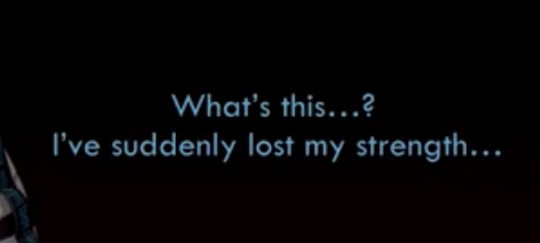
With Milgram’s themes of reinforced and rejected thoughts, I believe the most plausible explanation is a type of mental block instated in the prisoners’ psyches that prevents them from completing actions with the intent to harm or restrain the Guard. (Of course, it’s possible there really is just a magical barrier, but given the results of Kazui’s little experiment and Milgram’s emphasis on altering thought patterns, I think it’s unlikely.) My most pressing question about this is whether the mental block prevents a prisoner from carrying out any action with harmful intent toward the Guard, or if it only stops direct actions.
For example, say Muu wants to hit Es on the head with a rubber mallet. To accomplish this, she comes up with a design for a convoluted mechanism that effectively removes her from the act of wielding the hammer itself. For the sake of consistency, we’ll say the sequence of events is as follows:
Someone tips over a cup. The cup hits a rubber ball, which rolls down a ramp and hits a series of books set up like dominoes, which all fall one after the other. (I don’t have time to do a full illustration right now, but here’s something I sketched out really quick as a visual reference.)

The last book falls off a table onto the pedal of a trash can, which opens the lid and sends a tennis ball flying. The ball knocks over a metal water bottle, which releases the string held in place beneath it.

The string is tied to the rubber mallet, suspending it in midair above a doorframe. Releasing the string also releases the mallet, dropping it directly onto Es, who is (hopefully) standing underneath the doorframe.
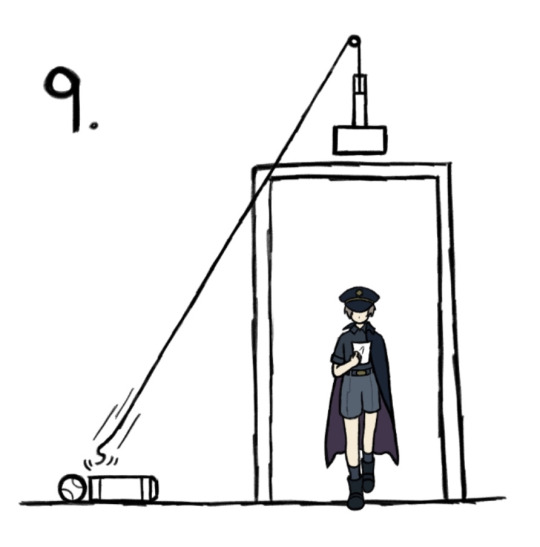
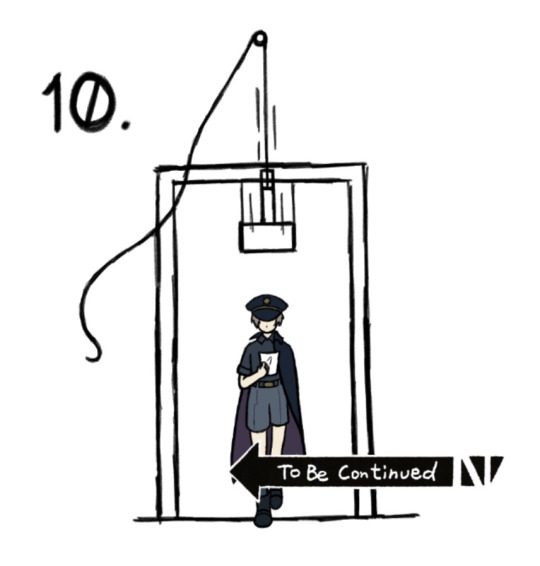
There’s enough steps in the sequence to remove Muu as the one dropping the hammer. However, she would still be acting with the intent to harm the Guard. So, would she be unable to complete the action due to the mental block? If the answer is yes, as I theorize, then this obstacle can be bypassed with another workaround: telling someone else to do it for her.
If she tells Haruka that activating the mechanism will release confetti, and she obscures the mechanism enough that he will be unable to discern the actual purpose, (e.g., covering it with a curtain,) then Haruka would be able to activate it because he is acting without ill intent. Since he is fully convinced that the mechanism will release a shower of confetti, he can activate the chain reaction where Muu would be stopped by the mental block.
This leads to another possible obstacle, though. Would the mental block prevent Muu from building the mechanism in the first place? Since she is making it with the intention to cause harm to the guard, would she be unable to create it? It all depends on just how deep the mental block runs.
Based on what we’ve witnessed so far, I’m guessing that the mental block doesn’t extend quite that far. As seen with Fuuta, Kotoko, and Kazui, (and now Amane as well,) the prisoners are still capable of acting with the intention to harm Es; the mental block just stops them from completing the action. In other words, they can try to punch Es, but they’ll be forced to stop right before hitting them. Similarly, Kazui’s attempt to restrain Es was possible at first, but he quickly lost the strength to do so.
It is likely that Muu would be able to build the mechanism in the first place, but attempting to activate it in order to hit Es would result in either her suddenly losing the strength to do so, or another “invisible wall” where her muscles lock up right before she can tip the cup over.
If Muu lies to Haruka about its true purpose, however, Haruka will be able to activate the mechanism in her stead, and the hammer will successfully hit its mark, provided Es is standing in the right place.
So here’s how they could kill Es with a banana peel…
#milgram#es milgram#listen. i really like digging into the details of how plot mechanics work.#figuring out the rules of a vague convenient power is one of my favorite hobbies.#yes i wrote all this just to end with that punchline.#milgram theory
200 notes
·
View notes
Text
Class and Privilege in Jordan Peele’s ‘US’


Honestly, when I first watched this movie, I didn't get it. Like at all. Buuut after uncovering the many many layers of its symbolism in class, I struggled to pick what I should even talk about in this post. After taking the time to really listen to each character’s words, and reflect on a lot of the directing decisions evident in how the Wilson family interact with the ‘tethered’, I found that the discourse surrounding class and privilege was staggeringly obvious, and I just didn’t see it right in front of me. Which, I suppose, is true for a lot of people that are lucky enough to lead very privileged lives outside of the cinema - and honestly, is personally a bit embarrassing for me that I didn’t realise this movie motif sooner.

A key theme that almost went completely over my head in the first viewing of ‘US’ was privilege, which is illustrated by Winston Duke’s character ‘Gabe’ trying to make sure the family ‘keeps up’ with the typical suburban middle class lifestyle that is often associated with the domestic ‘American Dream’. For example, taking a beach holiday in Santa Cruz, buying a boat and staying in a neighbourhood that is predominantly made up of white people (or as far as the film shows us).

Zora and her mother look and appear to feel a little out of place on the beach; Zora doesn’t want to go into the water (maybe because she doesn’t want to get her hair wet, but its never specified), which the twins find weird, and Adelaide doesn’t want to relax and tan and drink on the deckchair in the same way that the white mother does - which makes the whole scene quite uncomfortable to watch - so I could really empathise with that uncomfortable feeling of being just a little bit out of place in this white-normative world.
Subtle insinuations that Gabe wants to be on par with his ‘peers’ (the white family in the film) are made through the dialogue in the beginning scenes of the film. Gabe even comments on how Josh just ‘had to’ get that new car, and repeats ‘it’s not about the size of the boat’ and ‘it’s not a contest’ just often enough to generate that feeling of unease and discomfort among other characters. If there’s anything I’ve learned about Jordan Peele films, it’s that nothing is by accident.

Although this film isn’t explicitly about race in the way that ‘GET OUT’ is, we have to acknowledge that the black family at the centre of this film is probably one of relatively few other black families that share their income level.
Whenever someone is in a position of power, there’s always that underlying question of who they had to overtake to get there - which embodies the dichotomy of the ‘American Dream’, which is built on the notion that anyone can ‘make it’ in the United States with sincere, hard work - which is not the case, if institutional racism has anything to do with it.

The ‘tethered’s’ mission is very much based on a ‘dog eat dog’ mindset, and Red even says “it’s our time now”, as the film later cuts to a news channel reporting hundreds of families killed and overtaken by their doppelganger counterparts. When Gabe asks “Who are you people?”, Red responds by saying “We’re Americans” - and that really struck me.
In this film, it feels like Jordan Peele is trying to destabilise and disrupt conventional meanings of what it means to be ‘American’, and actually allude to how American, like many countries, has acquired their wealth through the dispossession, exploitation and oppression of indigenous people, African Americans and other minority groups.

This notion was strengthened by the likening of the tethered outfits to prison jumpsuits in class, a point made by Professor Due, which got me thinking about the horrifying reality of mass incarceration in America, which can almost be seen as a kind of sick, twisted industry that generates free prison labour, profits private prison companies and maintains long standing racial inequalities across the US. OH WAIT - I JUST HAD A REVELATION (obviously probably not the first person to make this connection but whatever) - ‘US’ also stands for ‘United States’ - which makes a lot of sense if I’m running with the idea that this film is really a socio-political discourse on privilege and oppression in modern-day America.

Finally, a little more from me and my personal experiences. Although I don’t like to think about it as much as I should, everything, and I mean EVERYTHING I am and I have today is due to the hard work and sacrifices of my ancestors. From the endless bloodshed and torture my people endured during the fight for Indepedence from British Colonisation in India (which was achieved in 1947 - less than 100 years ago!) to the sleepless nights and workplace discrimination my parents faced as junior doctors that moved to the UK to give their little girl a better quality of life. In fact, I’m going to go call them and tell them how grateful I am right now.
Thank you for reading!
Until next time,
Vedika
0 notes
Note
about tankhun and the "nu" title in kinnporsche. don't the keerati household use "nu" with kuea, too? but in cutie pie it's translated as young master.
what if "nu" actually means "young master"? and "khun nu" is another variation of it?
The Nu Diminutive in Thai
Nu หนู means mouse.
But like calling your friend or lover "baby" it doesn't actual MEAN mouse when used in direct address.
If you see what I mean?
It means small and cute and in most contexts... young, sweet, innocent.
My Thai bestie hates this one (as the self reference I pronoun in particular) although it is in common parlance among some women. I think it has (or had) chibi connotations and she has baggage around fat shaming. Or it’s possible it’s more demeaning/cutsie when applied to (or used by) women. Like donning a “baby voice” would seem in English.

Daisy CHOOSES to use Nu in SCOY. Opting for it even as a pronoun. (The translators chose “little one” for when Touch uses it on Daisy, which I thought was adorable.)
Nu Kuea (and Nu Diao) is kind of a non-standard honorific usage in Cutie Pie. I'm not sure if Kuea opted for it, or if he got it in childhood like most Thai chu len and it stuck (at least within his family unit, including Lian). I’ve been paying attention and Kuea doesn’t often use nu as his personal pronoun in response, mostly opting for pom. Which suggests it’s more of a family nickname that he’s been granted rather than a later in life choice, like with Daisy.
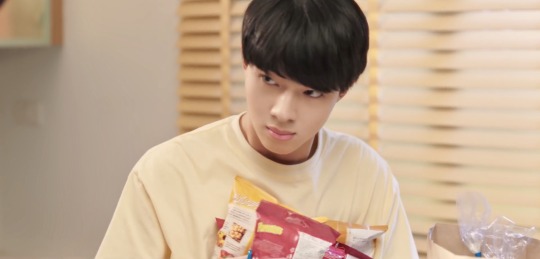
You see, how the name is being used by the person it’s given to makes a difference. Do they adopt it and take ownership as a pronoun themselves, do they take it as a title or special name used by only by someone else (or a specific group) - a pet name, or do they ignore that it’s being applied to them?
The debate over the Khun Nu in KP as to do not with the word itself, but how that word is changed when putting the Khun honorific in front of Nu.
Khun is a formal codified society wide honorific (and pronoun). It can be translated as mr/mrs/ms but it’s not quite right. So I was being facetious when I said Mr Mouse, but that would be a (kind of) direct translation.

The fact that it’s his bodyguards (technically his subordinates) who Tankhun treats like (abused) friends calling him Khun Nu is the source of the confusion.
Does the juxtaposition of formality (khun) + diminutive (nu) materially change the meaning away from the diminutive? Is it still affectionate or is there disrespect packaged in it? Is Khun Nu a bit more like Khun Chai (which is an affectionate slight. "Young master" is a possible way to translate Khun Chai. See Ae and Pete in LBC). Or is it something else? And how does all this have to do with Tankhun’s evident mental instability and fragility as the oldest brother of such a powerful family?
And does it matter that it is THIS character? A fictional character.
How would Khun Nu work IRL? Who is it normally used on? And by whom? Parent to child? I used to call my nibling “Miss Thang,” but now their older I never would do that. I suspect Khun Nu has an age implication attached to it.
I can tell you, Kinn and Kim sure as shit wouldn't put up with Khun Nu from their bodyguards.
So like, for me, growing up when I did, and with English there is a complete difference between being called babe and baby, even though they have the same entomology. I find babe dismissive and abrupt, I'm okay with baby but also NOT a baby-ish person so none of my lovers have ever actually called me that. While many have tried for babe, and been shut down.
I’m not saying it’s the same, I’m just using that to illustrate how a modifier or modification can totally change the meaning of a word, even though it doens’t really seem all that different to an outsider listening in. Honorifics and particles in Thai are modifiers, they function to change the meaning/tone//implication of the word/name (or whole sentence) that they are attached to.
(source)
#kinnporsche#thai bl#thai linguistics#cutie pie#Secret Crush On You#thai pronouns#thai particles#thai honorifics#cutie pie the series#scoy#touchdaisy#liankuea
151 notes
·
View notes
Text
Okay, so in Crown of Swords (beginning of Chapter 27), Perrin thinks about how "a long while had passed since anyone had been able to pick him up and throw him". The wording here strongly suggests to me that this isn't hypothetical - at some point, someone did pick him up and throw him. Now in and of itself that doesn't necessarily mean anything, because picking up and throwing small children is pretty normal and helps them develop proprioception and vestibular awareness, you just have to be gentle and aim for a soft surface. Except, first of all, he's specifically comparing this implied event to Rand using the One Power to throw him into a column hard enough to crack his ribs. And second, Perrin's proprioception is pretty bad, and was worse when he was a child (adults with working body awareness do not need to move with the kind of conscious caution Perrin does, even if they're bigger and stronger than most people), suggesting that, if anything, he was not tossed into appropriate soft surfaces enough as a child. So when Perrin was small, someone picked him up and threw him in like, the bad way. Like very possibly into a wall. (I want to note also here that "For one moment there, he had been sure Rand was going to kill him.", and while that's obviously partly meant to illustrate how unstable Rand's mental health is at this point, the entire fight they had was staged, and that Perrin was, however briefly, sure, not just afraid but sure that Rand was going to kill him seems to support that this interaction maybe set off a little bit of a trauma response). We could also talk about the dissociation and the staggering alexithymia (seriously, the only other character who comes close to Perrin's level of obliviousness to his own physical and emotional condition is Lan), but that could just be the neurodivergence - it's not terribly compelling evidence on its own.
Now, Perrin, prior to moving in with the Luhans, did not only live with his parents. I think we can rule out any of his siblings having thrown him, since he's the oldest by like five years (we'll come back to that) and the middle two Aybara kids are girls, but his uncle, Eward, Eward's wife Magde, and their three children also lived on the Aybara farm, so that's at least one other adult who was at one point probably able to pick Perrin up and throw him, and three cousins whose ages (and therefore possible relative sizes) we don't know. If the only thing in play were "Perrin was apparently physically abused as a young child" we wouldn't necessarily have an obvious culprit.
However, parental abuse is actually pretty rare in Wheel of Time. I mean, lots of parents do things that we here on Tumblr, as mostly youngish adults with a 21st century perspective, would recognize as abusive, like spanking. I'm almost sure there's reference somewhere to children being sent to bed without supper, too, and Siuan having her mouth washed out with soap for swearing as a Novice isn't remarked as particularly egregious, so that might be something parents do. But like, product of its time and all that. Parents in WoT largely don't hit their children, outside of spanking and similar. They don't throw them into walls. Hell, if I remember rightly, even Moghedian, one of the actualfacts Forsaken, didn't hurt those two boys she stole - as best the Wondergirls were able to determine, their trauma was almost entirely from watching their parents die. Except, now we gotta talk about Gawyn Trakand. Direct textual evidence for how Taringail treated Gawyn is pretty thin on the ground. We know he "had never been much of a father" to Gawyn, but that could mean almost anything. But the head trauma. The fucking head trauma. We know Elayne gave him at least two concussions for which he didn't receive Healing(TDR ch. 24), but then we have to ask, where did she get the idea that it was normal and okay to hit him in the head that hard? One can hardly imagine Morgase or Lini doing such a thing. (I'll refrain from going on a tangent about the evidence that Gawyn's vision was permanently impaired by at least one precanonical head injury, as it's not directly relevant here). What we know about what the Damodreds, in general, are like also reinforces the idea that Taringail abused Gawyn. I'm going somewhere with this, I promise.
See, Gawyn doesn't look like Taringail. I mean, at all. In point of fact, he looks like an X-23 style "change one sex chromosome and nothing else" clone of Elayne. Red hair is rare outside of the Aiel, and rarer in Cairhien than most places. Available textual evidence does not support the idea that there are any light-eyed Damodreds aside from Elayne and Gawyn, who look a lot like each other and Morgase and not a damn thing like Taringail. No one from the third age knows about genetics, as such, but basic inheritance patterns are hard to miss. But you know who does have blue eyes? House Trakand's bard, who did at least half the work of getting Morgase on the throne, and who's been close to her since she was a teenager - Thom Merrilin. To be clear, I don't think Thom is actually Gawyn's father. I think Taringail is, because Morgase confirms it in her own internal monologue, where she has no reason to lie, and I trust her to know who she slept with. I think that in the early Age of Legends, before the ban on human and animal genetic engineering was put into place, they created a dominant blue eyed gene, to help keep the Aiel visually recognizable, maybe a dominant red haired gene as well, and that the Trakands have an Aiel ancestor somewhere way back up the tree. But Taringail doesn't know that. Taringail just knows that the first child of his loveless marriage of state to a very young woman looks nothing like him and enough like Thom Merrilin to be more than a little suspicious. And there's decent, if not unambiguous, evidence that he abused Gawyn.
So we've got two characters, Perrin and Gawyn, with evidence of parental abuse, in a context where that's rare enough to be noteworthy, and we know that Gawyn's father had good reason to suspect that Gawyn wasn't his. Well okay, what about Perrin? He doesn't particularly look like his dad, is what I can say with certainty. The only physical description Con Aybara gets is "slim", which is uh, not among the words I'd use to describe Perrin. Certainly just, y'know, looking at him at any point after infancy, there'd be some visual evidence that's Perrin wasn't actually related to Con. (Maybe during infancy too, but that gets into the "Rand is at least a year younger than he ought to be" thing which is a whole different theory). So, physical abuse when the only other case we really see of that involved the perpetrator suspecting the kid wasn't his, and he looks sufficiently unlike his father that Con would have been justified in similar suspicion.
But I have more. Paetram Aybara's existence is, in itself, evidence that either he or Perrin is the product of either infidelity or covert polyamory. It's pretty rare in this setting for men to have brothers who are full siblings, and rarer still in Rand's generation. Among the older generations, we don't have enough of a family tree to really say. We don't know whether Laman's brothers were his half or full siblings, or whether Con and Eward Aybara were, or whether any of Siuan's uncles were full siblings to each other. Leane Sharif had brothers, plural, I believe, although we don't have details. But we do know that for like, the kids, it's virtually unheard of. The Basheres apparently had three boys, and I can hardly imagine either of them having kids with anyone other than each other (although since Faile's older brothers are never named and died off screen before she enters the story, they don't feel entirely, y'know, real), but other than that it's just Perrin and Paetram. And then with the largest age gap of any two siblings, half, full, or otherwise, in the series. By and large, there seems to be a limit of one boy per pairing, although whether this is accomplished through The Pattern, reliable and undescribed methods of selecting a child's sex during conception, sex-selective abortion, or a truly distressing amount of infanticide, I really wouldn't venture to guess. I had initially thought that Paetram's existence might be attributable to the Aybaras going for a second boy during or shortly after the breakbone fever outbreak in 989ish, out of fear that they'd lose the one they already had, since the timing just about lines up, but it would make at least as much sense if Perrin and Paetram, y'know, weren't full siblings.
Okay, so that's the evidence that Perrin isn't, biologically, Con Aybara's son, but why Haral Luhhan? Since part of our basis for this is that he doesn't look like Con, on account of he's Huge, we're looking for a pretty big guy. Among men in the Two Rivers who get a physical description, there are two reasonable candidates: Haral Luhhan and Bran al'Vere. But I don't think it's Bran, because of the show. I trust Rafe not to have missed anything I caught, and he decided to throw in possible romantic feelings between Perrin and Egwene. I shan't say "Rafe would never write a near miss with accidental half-sibling incest." but I will say that I don't think he would have done it casually. Which means that Rafe does not think Perrin and Egwene are related, and that's good enough for me. My only actual uncertainty is whether Perrin's biological father is someone from the Two Rivers at all - Eye of the World is at some fucking pains to avoid telling us whether Mat or Perrin were born outside the Two Rivers, so the possibility cannot be discounted.
One of the problems with Wheel of Time is that there's just, so much going on, sometimes you catch a new implication casually thrown into an offhand sentence in the middle of a scene about something else, and you work it through with other textual evidence until you've got a pretty good idea what it means, and you move on with your life, but now you know this new thing, and it becomes part of your basis for further analysis, and you try to talk about a theory that's partly based on it and people go "Wait, what do you mean Haral Luhhan is Perrin's biological father?"
44 notes
·
View notes
Text
I want to break down what Mary says to Stede during the flashback in episode 4 where she’s trying to talk about his unhappiness. Because while I’m not here to shame Mary for showing up imperfectly or not being a therapist, I think a lot of people are missing the fact that she handled the conversation poorly. I certainly applaud her for making an effort, but it’s not surprising it wasn’t effective.
She opens the conversation with the line “I know you’re unhappy. I’m unhappy too.” As a start this is fine. Certainly we have to give credit to her admitting to her own happiness as a fantastic gesture of empathy and vulnerability which should serve to help Stede feel more comfortable as well. Beyond that it seems likely what Mary is attempting to do is circle back to the argument they had earlier regarding the ship in a reconciliatory way, validating his emotions that lead to his actions even if she didn’t like the actions themselves. And I do think if she had said this during the fight where it was clearly a deescalation, it probably would have gone over relatively well.
The problem is this happening much later that day, so instead of deescalating from yelling to a calm tone, this reads to Stede as an escalation from the conversation being over to Mary bringing it up to needle him about it again. Given Stede's history of abuse and harassment, it's very possible that he's even thinking this is some kind of test or trap, and if he fails it by admitting to his unhappiness he'll get in trouble again. Mary's comment about being unhappy too helps, but only if he hasn't internalized that he is held to different, stricter standards than other people.
Like I said, I don't hate it as an opening; Stede's negative reaction has just as much to do with his own issues as it does Mary's presentation. But if I were to make suggestions, I would say to get rid of the sentence "I know you're unhappy" which could feel accusatory to Stede, and replace it by making the implicit apology here explicit. For example, "I'm sorry I yelled at you for calling our lives monotonous earlier. The truth is, I'm unhappy too."
So Stede says that he isn't unhappy, which Mary replies to with, "No? Sometimes, I think I I've heard you crying. By yourself?" I understand the impulse here that prompts Mary to say that. When someone tells you you're wrong, it's a normal reaction to immediately pull out evidence that you're right. Especially when it might feel to her that Stede is being deliberately uncooperative just to be stubborn or petty. But holy cow, is that one of the worst possible responses she could have given here.
To start with, while I said Stede might find her first statement accusatory, just about anyone would feel that way about this statement, since it literally is an accusation. Her tone might be tentative, but the clear meaning here is she is accusing him of lying. Of course that's going to make Stede feel defensive.
Not only that, but Mary has no right to contradict Stede about what his personal feelings are. No one has the right to tell anyone else what they're feeling, and doing so is incredibly infantilizing. I don't care how sure Mary is that Stede is lying, she shouldn't say that, not unless she's pointing out a direct contradiction in something else that he had said. Beyond that the most she should be doing is explaining how certain words or actions of his made her feel and the impression they gave her.
We could charitably assume that that's actually what she's trying to do here, but beyond the fact that she should have been clearer about her intentions if that is the case, she should have chosen literally any other behavior of Stede's to illustrate her point. If she's heard Stede crying alone, on multiple occasions no less, then we have to assume those were deeply personal emotional moments for him, the kind that would make him feel uncomfortable and embarrassed to have overheard in the best of circumstances. And here Mary is using those private moments of pain as a gotcha to make an accusation she has no right to be making in the first place.
What the better response would be in this situation depends on what Mary wants to accomplish here. If she thinks it's important to have Stede open up to her emotionally, then rather than trying to facts and logic him into admitting how he feels, she should be focusing on making him comfortable with telling her. Tell him it's okay if he's unhappy and validate that he has reasons to be and share more of how she's also unhappy. But if she is more concerned about having a conversation about how to improve things and move forward, then just accept what he said and back her point down to something more neutral that still allows that there is a problem to be addressed; say they aren't as happy as they could wish to be.
After Mary tries to call Stede out for crying, Stede denies that he did any such thing. This prompts the final point in the conversation before Stede fakes sleeping to be out of it, where Mary says, "I know we never would've chosen each other, not in a million years, but all we have is this one life. We have to try, don't we? Otherwise, what's the point?"
I do like the bit about how they never would have chosen each other; that builds that empathy between them and it also fits in with what I was saying about validating that Stede has reasons to be upset. It's also important to recognize that at this point I don't think Mary is necessarily trying to get Stede to open up to her. I still want to assess it on that metric, but to be fair to Mary this last statement seems to be just as much about her trying to work through her own feelings as it is about trying to engage with Stede.
That said, "we have to try" is just a terrible thing to say here on a number of different levels.
1) It comes off as dismissive of Stede’s unhappiness. Yes, it’s true on some levels that unhappiness doesn’t mean you shouldn’t still try, but actual compassion for Stede’s unhappiness would involve looking at how to adjust expectations and standards to account for and hopefully address that unhappiness, not just an insistence he needs to keep trying anyway.
2) It actually undermines the empathy of admitting to her own unhappiness and the fact that neither of them would have chosen each other. Now instead of a show of solidarity, it feels like another way to dismiss Stede’s unhappiness: I feel unhappy too and I’m still trying so there’s no excuse for you.
3) It carries the implication that Stede has not been trying. Best case scenario here is that he really hasn’t, and now he’s being shamed for that which is unlikely to achieve anything beyond making him feel bad. The alternative is Stede has been trying, and now he’s just been told that his efforts have gone unnoticed and unappreciated and they do not count. At that point he may well stop trying because why bother if it’s not going to be good enough anyway?
I want to take a brief detour to talk about the ship conversation and how their miscommunication there is reflected in Mary's comment about trying. To Mary, going to live on a ship is very much a case of you can't run away from your problems because you take your problems with you. Because she would literally be taking Stede, the source of her problems (both in an interpersonal sense and as a symbol of her being forced to marry someone she did not know, wouldn't have chosen, and is not compatible with), with her. So this does not look like Stede is trying to fix things here, just paper over their problems with silly distractions.
For Stede, his unhappy marriage is only one of the problems he has as a effeminate neurodivergent queer living in a society that tolerates none of those things. Running away to live on a ship where he wouldn't be facing constant disdain for everything he is from all sides would in fact solve some of his problems. Not all of them, but enough to give him more mental and emotional capacity to start addressing the rest. This idea was him trying, and it was a reasonable good faith effort on his part.
I don't have any specific advice regarding Mary's last comment. Instead it relates to my overall impression of what went wrong here on Mary's end. She came into this conversation with an open heart and desire to talk things through with Stede, but not an open mind or any interest in hearing Stede. She seems to have already made up her mind about Stede's intentions and what kind of person he is, and to be honest it's not a flattering picture. Stede does need to learn to open up more, yes, but also their relationship was never going to improve unless Mary started to be willing to hear him, and admit she was wrong about him.
26 notes
·
View notes
Text
Ted Lasso 2x11 thoughts
For an episode that ends with a journalist Ted trusts but has (understandably) recently lied to warning Ted that he’s publishing an article about his panic attacks, it was fitting that this episode seemed entirely about what all of these characters choose to tell each other. And after most of a season of television that Jason Sudeikis has described as the season in which the characters go into their little caves to deal with things on their own, it turns out they are finally able to tell each other quite a lot.
Which is good because, um, wow, a lot is going to happen in the season finale of this show!
Thoughts on the things people tell each other behind the cut!
Roy and Keeley. I absolutely loved the moment during their photoshoot in which they bring up a lot of complicated emotional things and are clearly gutted (“gutted”? Who am I? A GBBO contestant who forgot to turn the oven on?) by what they’ve heard. We already know that Keeley and Roy are great at the kinds of moments they have before the shoot begins, in which Roy builds Keeley up and tells her she’s fucking amazing. From nearly the beginning of their relationship, they’ve supported each other and been each other’s biggest fans. But their relationship has gone on long enough that they’ve progressed from tentative arguments about space and individual needs into really needing to figure out what they mean to each other and how big their feelings are and what that means in relation to everything else. Watching these two confess about the uncomfortable kiss with Nate, the unexpectedly long conversation with Phoebe’s teacher, and—most painfully—the revelation that Jamie still loves Keeley didn’t feel like watching two people who are about to break up. (Although I could see them potentially needing space from each other to get clarity.) It felt like watching two people realize just how much they’d lose if they lost each other, which is an understandably scary feeling even—or especially—when you’re deeply in love but not entirely sure what the future holds. Not entirely sure what you’re capable of when you’ve never felt serious about someone in quite this way, and are realizing you have to take intentional actions to choose that relationship every single day. I’m excited to learn whether Roy and Keeley decide they need to solidify their relationship more (not necessarily an engagement, but maybe moving in together or making sure they’re both comfortable referring to the other as partner and telling people they’re in a committed relationship) or if things go in a different direction for a while.
Sharon and Ted. I’ve had this feeling of “Wow, Ted is going to feel so intense about how honest he’s been with Sharon and is going to end up getting really attached and transfer a lot of emotions onto the connection they have and that is stressful no matter how beneficial it has been for him to finally get therapy!” for a while now. And Sharon’s departure really brought that out and it was indeed stressful. But the amount of growth that’s happened for both of these characters is really stunningly and beautifully conveyed in this episode. Ted is genuinely angry she left without saying goodbye, and he doesn’t bury it some place deep inside him where it will fester for the next thirty years. He expresses his anger. (I also noticed he sweared—mildly—in front of her again, which is really a big tell for how much he has let his carefully-constructed persona relax around her.) He reads her letter even though he said he wasn’t going to, and he’s moved. I don’t think Ted has the words for his connection to Sharon beyond “we had a breakthrough,” but Sharon gets it, and is able to firmly assert a professional boundary by articulating her side of that breakthrough as an experience that has made her a better therapist. And is still able to offer Ted a different kind of closure by suggesting they go out before her train leaves. No matter how you feel about a patient/football manager seeing their therapist/team psychologist colleague socially, I appreciated this story because IMO it didn’t cross big lines but instead was about one final moment in this arc in which both Ted and Sharon saw each other clearly and modeled what it is to give someone what they need and to expect honesty and communication from them. I liked that Ted ends up being the one saying goodbye. (The mustache in the exclamation points!) I like that whether or not Sharon returns in any capacity (Sarah Niles is so wonderful that I hope she does, but I’m not sure), the goodbye these characters forge for themselves here is neither abandonment nor a new, more complicated invitation. It’s the end of a meaningful era, and although the work of healing is the work of a lifetime, it’s very beautiful to have this milestone.
Ted and Rebecca. So, maybe it’s just me, but it kinda feels like these two have a few li’l life things to catch up on?! (HAHHHHHaSdafgsdasdf!) I really adored their interactions in this episode. I maintain that Biscuits With The Boss has been happening this whole time (even when Ted’s apartment was in shambles, there’s biscuit evidence, and I feel like we’ve been seeing the biscuit boxes in Rebecca’s office pretty regularly too), even if it might have been more of a drive-by biscuit drop-off/feelings avoidance ritual. It was really lovely to see Ted on more even footing in Rebecca’s office, joking around until she tells him to shut up, just like the old days. And GOSH—for their 1x9 interaction in Ted’s office to be paralleled in this episode and for Ted to explicitly make note of the parallel in a way Rebecca hears and sees and understands?! MY HEART. In both of Rebecca’s confessions, she is not bringing good news but it is good and meaningful that she chooses to share with Ted. In both situations, Ted takes the moment in stride and offers acceptance equivalent to the gravity of what she has to confess. And in both situations, he’s not some kind of otherworldly saint, able to accept Rebecca no matter what because he’s unaffected by what she shares. He is affected. When he tells her about Sam, you can see a variety of emotions on his face. Rebecca is upset and Ted is calm, and even if I might have liked for him to try to talk about the risk the affair poses to the power dynamics on the team or any number of factors, I also really liked that he just accepts where she is, and—most importantly—does not offer her advice beyond examining herself and taking her own advice. A massive part of being in a relationship with another person (a close relationship of any nature) is figuring out how to support that person without necessarily having to be happy about every single thing they do. It’s so important that Ted connects what she’s just told him about Sam back to what she told him last season about her plot with the club. These both feel like truth bombs to him, and he is at least safe enough to make that clear. These are both things that impact him, things that shape how he sees her and maybe even how he sees himself. He cares about her and is capable of taking in this information; he has room for it. But it’s not something he takes lightly, and neither does she. See you next year.
Tumblr user chainofclovers and the TV show Ted Lasso. My brain is going wild thinking about all the ways the next “truth bomb” conversation could go in 3x11 or whatever. Maybe they go full consistent parallel and Rebecca confesses something else, this time about her and Ted or some other big future thing that impacts him as much or more as the other confessions have. (The same but different.) Maybe the tables turn and Ted has something to confess to her. While the 1x9 conversation ended in an embrace and the 2x11 conversation ended with a bit more physical distance (understandable given the current state of their relationship and the nature of the discussion), the verbal ending of both conversations involved voices moving into a sexier lower register while zooming in to talk specifically about their connection to each other, so I have to assume there will be some consistencies in s3 even if the circumstances will be completely different. I don’t really know where I’m going with this and I obviously will go insane if I sustain this level of anticipatory energy until Fall 2022 but I have a feeling my brain and heart are going to try!
Sam and Rebecca. I know there’s been a lot of criticism about whether this show is being at all realistic about the power dynamics and inevitable professional issues this relationship would create. On some level, I agree; I like that pretty much everyone who knows about the affair has been kind so far, but you can be kind and still ask someone to contend with reality. But I also think that in nearly every plot point on this show, the narrative is driven by how people feel about their circumstances first and foremost. (It’s why the whiteboard in the coaching office and the football commentators tell us more about how the actual football season is going from a points perspective than anyone else.) This episode reminded me how few people know about Sam and Rebecca, and how much their time together so far has been time spent in bed. The private sphere. I thought this episode really expertly brought the public sphere into it, not—thank goodness—through a humiliating exposure or harsh judgment but through an opportunity for Sam that illustrates not only all his potential to do great things but how much Rebecca’s professional position and personal feelings are in conflict with that. Could stand in the way of that. I don’t have a strong gut feeling about where this will go, but I do think Sam’s face in his final scene of this episode is telling. He started the episode wanting to see Rebecca (his most recent text to her was about wanting to connect), and Edwin’s arrival from Ghana really exploded his sense of what is possible for his life. If he’d arrived home to Rebecca sitting on his stoop prior to meeting Edwin, he’d have been delighted. Now he’s conflicted, and whatever decision he makes, he has to reckon with the reality that he cannot have everything he wants. No matter what. And Rebecca—she has taken Ted’s advice and is attempting to be honest about the fact that she can’t control Sam’s decisions but hopes he doesn’t go, and even saying that much feels so inappropriate. And I’m not sure how much she realizes about the inappropriateness of the position she’s putting him in, although maybe she’s getting there considering she exits the scene very quickly. I’ve honestly loved Rebecca’s arc this season. I think it’s realistic that she got obsessed with the intimacy she thought she could find in her phone. I think it’s realistic that her professional and personal ambitions are inappropriately linked. (They certainly were for Rupert. It’s been years since she’s known anything different; even if she’s done some significant recovery work to move on from her abusive marriage and figure out her own priorities, she’s got a long way to go.) I know there are people who will read this interaction between Rebecca and Sam as a totally un-self-aware thing on the part of “the show” or “the writers” but what I saw is two people who enjoyed being in bed together and now have to deal with the reality that they’re in two different places in their lives and that one has great professional power over the other. If that wasn’t in the show, I wouldn’t be able to see it or feel so strongly about it.
Edwin and Sam. I really enjoyed all the complexities of this interaction. Edwin is promising a future for Sam that doesn’t quite exist yet, though he has the financial means to make it happen. He offers this by constructing for Sam a Nigerian—and Ghanaian—experience unlike anything he’s found in London. Sam is amazed that this experience is here, and Edwin’s response is to explain to him that the experience is not here. Not really. The experience in Africa. Sam has of course connected to the other Nigerian players on the team, but this is something else entirely. I’m really curious if Sam is going to end up feeling that what Edwin has to offer is real or not. That sense of home and connection? So real. And so right that he would want to experience that homecoming and would want to be part of building that experience for others. But at the end of the day, he went to a museum full of actors and a pop-up restaurant full of “friends,” and is that constructed authenticity as a stand-in for a real homecoming more or less real than the home he’s building in Richmond? (With other players who stand in solidarity with him, and with well-meaning white coaches who say dumb stuff sometimes, and an a probably-doomed love interest, and a feeling that he should put chicken instead of goat in the jollof, and the ability to stand out as an incredible player on a rising team.)
Nate and everyone. But also Nate and no one. Nate’s story is so painful and I’m so anxious for next week’s episode. For a long time I’ve felt that a lot of Nate’s loyalties are with Richmond, and a lot of his ambitions are around having given so much to this place without getting a lot back, and having a strong feeling that he’s the answer to Richmond’s future. But now I’m not so sure; his ambitions have transferred into asking everyone he knows (except Ted, of course), if they want to be “the boss.” But Nate is all tactics and no communication. When he wants to suggest a new play to Ted, he hasn’t yet learned to read Ted’s language to learn that Ted is eager to hear what he has to say. And while Ted has been really unfortunately distracted about Nate and dismissive of him this season, he clearly respects Nate’s approach to football and was appreciative of the play. Nate just can’t hear that. The suit is such a great metaphor of all the things Nate is in too much pain to be able to hear clearly. Everyone digs at him for wearing the suit Ted bought him (including Will, who’s got to get little cuts in where he can, because he’s got to be sick of the way Nate treats him), but when he gets fed up his solution isn’t to go out on his own and find more clothes he likes; he asks Keeley to help him. And then crosses a major line with her...and no matter how kind she was about it, she was clearly not okay. Everything is going to blow up, and I’m so curious as to whether Nate will end up aligning himself with Rupert in some way or if he’s going to end up screwed over by Rupert and in turn try to screw over his colleagues even worse than he’s already done. Or try desperately to make amends even though it could be too late for some. Either way, I’m fully prepared to feel devastated. (And there’s no way I’m giving up on this character. If he’s able to learn, I truly believe he could end up seeking forgiveness and forging a happier existence for himself. Someday. Like in season 3 or something.)
Ted and Trent. Trent deciding to reveal his source to Ted is a huge deal, and I’m torn between so many emotions about this exposé. I’m glad it’s a Trent Crimm piece and not an Ernie Loundes piece. I’m glad that Trent made the decision to warn Ted and let him know that Nate is his source. I fear—but also hope—that this exposure will set off a chain reaction of Ted learning about some of the things he’s missed while suffering through a really bad bout with his dad-grief and panic disorder. The things Ted doesn’t know would devastate him. I wonder if Ted will want to figure out a way to make Nate feel heard and reconcile with him, and I wonder how that will be complicated if/when he realizes Nate has severely bullied Will, gets more details on how he mistreated Colin, etc. I wonder if Rebecca, whom Nate called a “shrew” right before she announced his promotion, will be in the position of having to ask Ted to fire him, or overriding Ted and doing it herself. So many questions! I have a feeling it’ll go in some wild yet very human-scaled, emotionally-nuanced direction, and I’ll be like “Oh my GOD!” but also like “Oh, of course.”
This VERY SERIOUS AND EMOTIONAL REVIEW has a major flaw, which is that none of the above conversations include mention of the absolute love letter to N*SYNC. Ted passionately explains how things should go while dancing ridiculously! Will turns on the music and starts gyrating! Roy nods supportively! Beard shouts the choreography like the Broadway choreographer of teaching grown men who play football how to dance like a boy band. Everyone is so incredibly proud when they nail it. I love them.
I cannot believe next week is the end. For now. I’m kind of looking forward to letting everything settle during the hiatus, but I’ve really loved the ride.
#ted lasso#ted lasso s2 spoilers#ted lasso 2x11#meta by me#ALL THE FEELINGS!!!!#a lesbian watches ted lasso
133 notes
·
View notes
Text
I'm on team "it was his idea and his order but it wasn't literally his hands that left them there" so i voted "yes but"
we know that "lots of people" were required to get all one hundred juniors wrapped in deity-binding ropes and up into the demon-subduing cave, and that both the juniors themselves and wei wuxian both assume that these people were hired by a third party.


there doesn't seem to be any information about how these one hundred (one HUNDRED) juniors were actually captured in the first place, but what we ARE clearly invited to infer here is that it must have taken a lot of money.
which points in rather an obvious direction.
further evidence is that (in exiled rebels ch 65) jgy comes to prompt lxc to visit koi tower with his stories of strange goings-on in yiling, corpses going missing from nearby graveyards, sudden increase in walking corpses, etc, and even predicts a second siege at the burial mounds. then he uses lxc's visit to koi tower to ensure lxc is waylaid caring for jgy's injuries (acquired when an "unknown person" in koi tower assaults him).
if his actual Plan A was to escape to Dongying, it would be a hell of a weird coincidence for him to not only preemptively tell a bunch of sect leaders that there would be a second siege but also for someone close to jgy to coincidentally engineer the timed start of that second siege at the specific time that lxc has been lured safely to koi tower.
if you instead make the leap wwx makes — that the junior-napping and the Moling Su power suppression music were done at jgy's request and with jgy's resources — then you can make the causal chain match up.
that's the short evidence: cost and timing.
i did have more but it's total overkill~
the longer version is the evidence that jgy is actually the one who came up with the plan himself, because the major loose end here is "why is this plan so aggressive and risky? that seems unlike jgy" as expressed by wangxian:

we later find out that his plan is rushed because nie huaisang is rushing him, by sending his "letter of threat."
now, jin guangyao's word on his own actions at guanyin temple is of course not to be taken at face value, even when he admits to wrongdoing, because it's easy to see him throwing up his hands and going "yeah, whatever, I did all that stuff, fine," because he's despairing of being understood. but i still think this next section strongly supports the general assumption that jin guangyao masterminded the whole second siege fiasco, complete with attempting to kill the bulk of the cultivators at the siege. note especially "everyone understood" and "he'd be the one to strike first."

perhaps even more illustrative is right before the above passage, when lxc references what appears to have been a conversation that occurred during his time as a hostage, prior to the presence of any other hostages:

i don't know what the Mandarin actually says here but i read "an accident, a mistake" as an attempt to pass off blame entirely ("accident") which is followed by the realization that he can't do that and has to instead express regret for the choice he made ("mistake.")
the reference to an earlier off-page conversation about the second siege is a very strong indicator that jin guangyao "schemed havoc" at the burial mounds and talked to lan xichen about doing so, because, as pointed out in canon, lxc and jgy talk to each other about anything and everything; they can't stop doing it even when one of them kidnaps the other.
anyway the point is that the plan was his, his scheme, and putting the children there as bait was a key component of the plan, which means he must have planned that too.
and jin chan is one of the captured children, so jgy was probably more directly responsible for at least that capture.
hey mdzs friends i have a question for you
if you believe he DID capture them, and are able to, could you please point me to any supporting information from the novel, specifically?
a reblog for sample size would be appreciated!
53 notes
·
View notes
Note
What would you expect from the public, including minors, when torturing someone in public is done, especially when it's a public spectacle and people actually come to watch. Is liking to watch torture a thing in this case? My story is a medieval/steampunk fantasy by the way.
Well Anon, this does still happen today. It happens in the country I grew up in and consider my home. So… my first suggestion is to throw out the implication that this is a weird historical thing the world doesn’t have to deal with any more. Because it is still very real. And if you get any kind of success with your story there’s a good chance some of your readers will have experience with this.
It’s also significantly more complicated then ‘liking’ or ‘disliking’ so let’s unpack this a bit.
I’ve never actually seen anyone maimed or executed. But as a kid of around 9-10 I knew kids my age who had. We used it as a sort of… pissing contest basically. Kids would brag about it to show how hard they were, in the same way we’d stuff chilis into our mouths and see who could last longest.
It’s one of those bizarre kinds of ritualised self-harm that you end up performing in order to cope with awful things.
Because witnessing this kind of stuff is harmful, to adults and children. It can leave people traumatised and displaying some of the symptoms I write about here.
But, however old the characters, if they grew up somewhere where this is the norm then I absolutely guarantee they understand showing opposition is dangerous. They know their responses to these displays of brutality and power are used as a proxy for their loyalty and worthiness by the state.
And boy if you are in any way outside the norm, if you are queer or the ‘wrong’ ethnic group or faith, then the pressure to conform here is so much more intense.
I lived in Saudi, my home town is Dhahran. My parents are from opposite ends of Europe and they tried to raise me Christian. I still spent a lot of my teenage years unpacking stuff I’d absorbed about public executions, amputations, whippings etc.
From the kids I knew growing up (anecdotal evidence no matter how empassioned) I’d say the ‘normal’ responses to witnessing this kind of state violence are varied. Kids would get nightmares, start showing signs of mild anxiety disorders or depression. They’d become moody, angry and generally unhappy. Which they’d sometimes take out on other people.
But I can’t remember anyone ever explicitly linking it to what they witnessed. They’d try to hide this stuff. Some of them would double down on justifications for state violence (seemed pretty common.) They would, above all, deny there was a problem.
Because admitting to mental illness made you ‘weak’ and admitting to doubts about state violence made you a ‘traitor’. Which is a pretty risky thing to label yourself (even by implication) when you live in a state that publicly mutilates and murders people. (Note the author’s bias as a committed pacifist may be showing.)
As you may have noticed Anon, I still carry a significant amount of anger on this particular subject. This bottled vitriole is not directed at you or your story idea but at the states and politicians who make sure this brutality continues. It’s about the fact that I can remember a nine year old girl matter of factly talking about beheading at a birthday party.
Stepping back from the personal side of things for a moment we know from studies of PTSD and trauma survivors generally that witnessing violence can lead to lasting psychological symptoms. Including PTSD.
PTSD specifically is more likely when an individual is directly effected (ie physically hurt). But repeated exposure to traumatic events, including witnessing violence, makes the manifestation of long term symptoms more likely.
So a character that has seen dozens of these attacks is more likely to develop a long term mental health problem then a character who has seen only one. Regardless of age.
We can’t predict which individual symptoms an individual witness will develop or indeed when a witness might develop them. We just don’t know enough about how these things happen yet.
Having said that, the possible symptoms for witnesses are pretty much identical to the possible symptoms for torture survivors (link above.) I’d advise against using chronic pain for witnesses unless you have a clear idea of an underlying cause; it seems (anecdotally) to be more common in people who directly experienced violence.
If you decide to use insomnia there’s a masterpost on sleep deprivation here.
For mental health problems like depression, anxiety etc remember there are physical symptoms as well as symptoms related to mood. Characters who are trying to deny they have a mental health problem might focus overly on physical symptoms. Depression can cause nausea, vomiting and tiredness/lack of energy which might be mistaken for disease. Anxiety can cause chest pain and shakes.
Circling back let’s talk about some of the phrasing in this question for a moment. Because ‘choose to watch’ misunderstands the way states use these public displays of violence.
Attendance and witnessing of public executions and torture is often enforced. Sometimes overtly and sometimes more tacitly. Because the point of these displays is to hammer home the power of the state. That doesn’t work if people can easily choose not to go.
Here’s an example of what that overt and tacit enforcement looked like back home.
Tacit enforcement came from the timing and placement of executions and amputations. They took place on weekends, when almost everyone was off work. They were carried out in major towns and cities, where the population density was higher. The venue was typically on a main thoroughfare close to important sites. Which ensured a high volume of people would be in the area when the execution took place, whether there was due to be an execution or not.
So picture the town or city this is taking place in, in your story. When are the public holidays? Where are the markets? Where are the most popular religious venues? At what time will the most people be in these areas?
All of that will tell you where an execution or public torture is likely to take place. Because if you set this shit up in eye sight of the place most people buy food, at the time when the most people are out, you get witnesses.
Whether they want to be witnesses or not.
Overt enforcement, on the low end of the scale, means having officials among the crowd pushing people towards the scaffold. At home this seemed to be targetted towards children and people who were judged as ‘other’. Different races to the majority, people who might have been read as a different religion, people who might have been read as queer etc.
This is because the message is ‘This could be you.’
I know practices in other countries have sometimes gone beyond this. Police or armed officials will sometimes go out and gather a crowd of witnesses by just… approaching people on the street and demanding they attend.
This approach requires quite a bit of man power and is not practical or necessary in every setting. In most cases setting things up in the right place and time is enough to ensure a large number of witnesses.
What I’m trying to illustrate here is that a lot of people will see this stuff without having made a conscious choice to do so.
And making a conscious choice to see it… well it does say something about the character but not in the way you’re thinking.
Because these displays are all about the power of the state. Witnessing them, responding to them is performance and it’s a performance of state loyalty. You can’t expect someone to give their true opinion on public displays of violence when criticism or voicing ‘dislike’ could lead to them being targets of violence.
Basically if you’ve got characters going to see this stuff regularly then it’s worth asking why they feel the need to display their loyalty in this way. Sometimes it’s because they really really believe in the state. But often… they’re compensating for something.
Wrapping up I think it’s important to note there’s often a difference between what people say about this stuff versus what they actually feel. And that’s because these things are explicitly political and explicitly about the power a state has over it’s subjects.
The way individuals respond to these things in public and what they say about them in public effects how they are treated. Sometimes it comes with obvious legal sanctions. Even if it doesn’t… these displays are entirely about reminding people the state can kill them.
And it doesn’t actually discourage crime or civil disobedience but it does create a climate of fear and hostility which permeates daily life.
Think about why the state is insecure about their power. Think about how your characters live with that background radiation and whether it feeds into cultural ideas around things like martyrdom or nobility of suffering.
Remember that there is a difference between public and private life. Existing in these kinds of brutal states often means having quite a sharp distinction between them. This can create very strong bonds to those the characters trust. It can also create a big difference between private and public personas.
If you’re writing a world where public torture and executions are happening there’s more going on then just individual character’s reactions. You are saying something about the world, the ruling class and the politics of the area.
Take the time make sure you know what you want to say.
Available on Wordpress.
Disclaimer
#writing advice#tw torture#tw mutilation#tw racism#tw police brutality#execution#torture as execution#effects of torture on the public#public torture#public execution#writing torture#writing witnesses#writing symptoms#effects of torture#effects of torture on witnesses
129 notes
·
View notes
Note
hi. at this point it may be evident what i'm about to say. but for that ask meme: ALL OF THE QUESTIONS
JHFDASK YESSSS okay here we go!!!
1. Art programs you have but don't use: Clip Studio Paint!! I pretty much ONLY use it for the grid and text feature, otherwise I don't like the workflow haha
2. Is it easier to draw someone facing left or right (or forward even): Drawing in profile is the same to me from either direction, but for 3/4 view, I naturally gravitate towards / find it easier to draw people facing left
3. What ideas come from when you were little: Since I've been into Aveyond for so long, and that's what I mostly draw, I have a lot of ideas that pretty much originated as "I wanted to draw this as a kid and didn't have the skill to"!
4. Fav character/subject that's a bitch to draw: Te'ijal and also Galahad. it's the hair.
5. Estimate of how much of your art you post online vs. the art you keep for yourself: Finished art I'd say I share a good 90% of it! Once we get into sketches... hoo boy, maybe 40%?
6. Anything that might inspire you subconsciously (i.e. this horse wasn't supposed to look like the Last Unicorn but I see it): Whatever this is, it's either too specific to the piece or too subconscious for me to think of it
7. A medium of art you don't work in but appreciate: traditional illustration, painting, watercolor...
8. What's an old project idea that you've lost interest in: A heads up that my answer to this is sad but I'm trying to talk about this type of stuff relatively openly, so: spring 2021, I watched Willy's Wonderland for the first time w/ Ishti + Moonie; we kept talking about a Galahad & Mel AU for it. I had two pictures for it planned, and I drew one of them, and... the timing worked out where Moonie never got to see it, and I've lost the motivation to do the second one. But I like the first one and I'm glad I drew it and I take some comfort/peace in the fact that I was working on something I was excited to share with her at the time.
9. What are your file name conventions: I have a folder for all my art, a subfolder for every year, and then a subfolder for every month, which means there isn't that much overlap! so unless I have a funny title idea my file name conventions are generally pretty straightforward: "mella1.sai", "teijalahad.sai", "teijalstudy.sai" etc etc
10. Favorite piece of clothing to draw: Does armor count? If not, gambesons.
11. Do you listen to anything while drawing? If so, what: Yes!!! Pretty much always music, occasionally video essays. Usually I'll pick a song and play it on loop, or if I'm in the mood for more variety I'll pick a playlist or an artist and listen through that. I also really like drawing while on call with people.
12. Easiest part of body to draw: I'm so sorry for my answer. Boobs.
13. A creator who you admire but whose work isn't your thing: I'm not sure I have an answer for this one, actually - there's a lot of artists I like the work of who I wouldn't want to emulate, but that feels different to me?
14. Any favorite motifs: Not really, in theory I really love flowers but I almost never draw them
15. *Where* do you draw (don't drop your ip address this just means do you doodle at a park or smth): I used to draw pretty much everywhere, but post chronic pain it's my desk only because using a tablet hurts wayyy less than a sketchbook!
16. Something you are good at but don't really have fun doing: Landscapes / natural areas from photographs lol
17. Do you eat/drink when drawing? if so, what: Water ALL the time, coffee if it lines up properly
18. An estimate of how much art supplies you've broken: Very few!! Probably less than 10. I mostly draw digitally
19. Favorite inanimate objects to draw (food, nature, etc.): ARMOR AND WEAPONS
20. Something everyone else finds hard to draw but you enjoy: Hands and armor!
21. Art styles nothing like your own but you like anyways: Honestly the art styles unlike mine that I like tend to be ones... I wish I had... I'm really drawn to realistic, somber, softer stuff
22. What physical exercises do you do before drawing, if any: Tendon gliding exercises! Tbh I should start doing more, it might help
23. Do you use different layer modes: VERY rarely, mostly not
24. Do your references include stock images: Yessss
25. Something your art has been compared to that you were NOT inspired by: I KNOW this has happened but I'm totally blanking on it
26. What's a piece that got a wildly different interpretation from what you intended: I'm not sure if this counts but pretty much any time I get a "cute!" response on a te'ijalahad picture I'm like oh no please do not say that,
27. Do you warm up before getting to the good stuff? If so, what is it you draw to warm up with: I tend to warm up by drawing a headshot of the character I'm going to be drawing, but lately I've been trying to shift to warm ups that are more focused on like, the action of drawing and loosening up
28. Any art events you have participated in the past (like zines): I participated in a zine that ended up not happening, and I've done several fandom exchanges!! Mostly the Aveyond Winter Exchange, but also the Oneshot Podcast Network exchange on AO3 (yeah it was AO3 but I did art for it)
29. Media you love, but doesn't inspire you artistically: Infinity Train!!! absolutely adore it, the art style doesn't really inspire me at all & because I got into it in the thick of my hand pain I never got used to drawing it
30. What piece of yours do you think is underrated: None! I mostly draw Aveyond so pretty much all of my art is in the 1-10 response zone so it all feels pretty consistent gdjkgklsdf
2 notes
·
View notes
Text
in the kind of world where we belong
1k of pure fluff. You can also read it here on ao3!
"Did he do the thing back then?"
Ty turns the page. He's not really reading right now; mostly, he just likes the weight of the book on his lap, the comfort of familiar illustrations and familiar quotes. Kit is sprawled on the floor beside him, head pillowed on a folded arm. He's watching Ty. He's always watching Ty, these days.
"What thing?"
"You know", Kit gestures with his free hand, "the whole oh but I am not worthy of your hand thing. Jem seems like the type."
"You're the only one who calls him that."
"Not true. Tessa calls him Jem too, and you guys should probably start getting used to doing that. You didn't answer my question."
"I wasn't at the bridge", Ty hedges.
"Buuut?..."
"... But I overheard them talking later. I'm not sure if it counts, but he did seem to have done a…"
"A how could I possibly ask anything from you thing?"
Ty hides his smile behind his book.
"Yeah."
"Always being incredibly right all the time is a burden, but somebody's gotta do it," Kit declares.
Kit's not always right. He's never paid that much attention to Rosemary's demonology lessons, and it shows when they're discussing possible cases. His runes could use some work, too, and it's very clear he's only had one sparring partner his entire life.
But he's brilliant when it comes to people. It's something Ty has never managed to get the hang of, probably never will. You don't need to, Kit had told him, that's what Livy and I are for. We're a team.
The memory makes Ty tap his fingers on the spine of his book.
"What do you think?"
"Of what? Always being right? I just told you."
"No", Ty says, "of the whole… I couldn't possibly ask thing."
Kit's eyebrows go up. He stretches out, not quite managing to make it look casual, and readjusts his arm.
"I don't know. I think there's respect in the asking."
"Yeah?"
"Yeah. Like, if you don't ask, you're kinda making the decision for the other person, right? When you ask, it means you respect them enough to know that they'll tell you the truth, and it won't affect your relationship."
"Would you? Ask?"
Kit laughs, scrunching his nose.
It's kinda cute. When Kit laughs for other people, it's almost picture perfect; the ideal image of what a smile should be. A statue. Ty likes to make him laugh like this, with no thought as to what it looks like.
"Nah," Kit finally says. "I'm too much of a coward for that."
"You're not a coward."
"That's not what Livy told me yesterday."
"You really do need to get over your fear of heights, but that doesn't mean you're a coward. It means you have a sense of self preservation."
Kit smiles, his eyes almost disappearing. "Mom would kill me herself if I didn't by now."
"That might be counterproductive."
"Maybe. What about you? Would you ask?"
Ty puts a finger between the pages, closes the book, and looks at Kit.
It's only been two years since they first met. Only two years since Ty had gotten fed up with Tessa's excuses about her absences and followed her into someone else's house, slipping into a room to avoid being seen. Two years since he had held a knife to Kit's throat.
It's strange to think that his past self had been ready to hurt him if the need had arisen. Now Kit is as much a part of Ty as Livy is. Essential, like a limb or his own hearing. Part of Ty thinks he orients himself based on Kit's position, like pigeons and magnetic fields, and he hasn't found convincing evidence against the hypothesis yet. He finds himself off-balance whenever he can't hear Kit's footsteps beside his own.
Kit looks, lets himself be watched without the need to say anything. Ty slips down from his chair onto the floor.
"What would you say if I did ask?"
Lips part in surprise. Ty's gaze follows their movement, something like hunger in the pit of his stomach. Kit hurriedly sits up.
There's a red mark where his cheek had been pressed against his arm, and no matter how much Kit brushes his fingers through his hair, it's still a mess. There are bags under his eyes from staying up helping Ty study for the exams. Pink spreads across his face, climbing up onto his nose and ears, climbing down onto his neck. Ty wonders how far down it goes. If he's lucky...
Kit slowly smiles, a crooked canine peeking through his lips. It's the most beautiful thing Ty has ever seen.
"I'd say yes ," Kit says. "For you, Ty, it's always a yes."
Logically, there is no way the amount of air in the room has changed. He finds himself breathless anyway.
The book left aside on the floor, Ty drags himself to Kit, a hand hesitating in the air until the boy leans into his touch and then he's cupping Kit's face. It's soft. Ty's thumb caresses down, down, until he presses against the bottom lip.
Kit's breath is hot. Ty leans forward and tastes it himself.
It's a slow, gentle kiss, savoring the feeling. He cradles Kit's nape; feels warm, callused hands go up his shirt and settle on the small of his back. The rasp of his fingertips leads a shiver through Ty's spine.
Something warm and heavy settles in the pit of his stomach, makes its home there. He can't help but smile against Kit's mouth.
Ty pulls away. Blue eyes stare at him with the kind of glazed, lost look he's not used to seeing directed at himself. Kit's lips are red- blood has flown there, Ty knows, due to the pressure. He gives in to temptation and leans in for another brief kiss.
"So", Kit says, an eternity later. "You didn't actually ask, you know."
Ty, who has a lapful of his now boyfriend, grins at him. He can't stop tapping out a beat on Kit's rib cage- neither of them seems to mind it.
"You said yes anyway."
"I'm easy like that", Kit agrees easily.
Ty leans in, presses a kiss against his pink cheek. It's summer and the freckles won't stop showing. They're convenient targets.
"You wouldn't stop looking at me."
"Well, I'm sorry to say this was not the way to dissuade me from looking."
"Good", Ty assures him. "I like looking at you too."
Even after they spent a good half an hour making out, this still makes Kit go pink and duck his head. He does this thing when he notices he's gonna smile, where his nose crinkles and his lips press together, where the smile inevitably comes out anyway.
"Good", Kit says.
32 notes
·
View notes
Photo
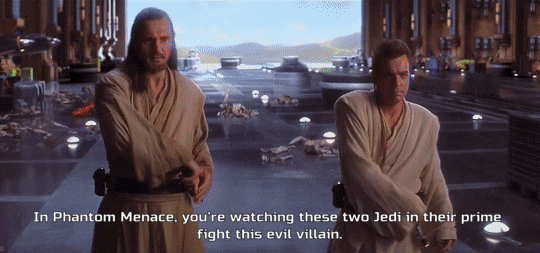
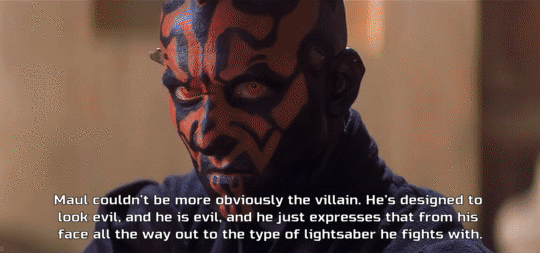


OKAY, IF I’M GONNA DO THIS, I’M GONNA DO IT PROPERLY. WHICH MEANS YEAH IT’S GONNA GET REALLY LONG. A couple of things to say ahead of time: Lucasfilm’s Story Group has always said CANON > WORD OF GOD when it comes to these matters, so when I quote canon examples from supplementary materials that contradict what he says, that’s LF’s official position, but that doesn’t mean that an influential person like Dave’s views couldn’t affect how things will be shaped in the future, like Deborah Chow listening to this may be influenced by it on the Obi-Wan show, despite that Master & Apprentice contradicts him. It’s an incredibly murky area! Mileages are going to vary. Another thing to keep in mind is that Dave Filoni never worked on The Phantom Menace, that was long, long before his time at Lucasfilm (which I think he joined sometime around 2007? and TPM was released in 1999), that he has worked with George more than probably anyone else, but we cannot and should not treat him as infallible or the True Authority on things, because even Dave himself has said things like: “I mean, I know why I did that and what it means, but I don't like to explain too much. I love for the viewers to watch stuff and come up with their own theories -- and they frankly come up with better things that I intended.” --Dave Filoni, Entertainment Tonight 2020 interview Or, in the same episode as the above Qui-Gon interpretation:
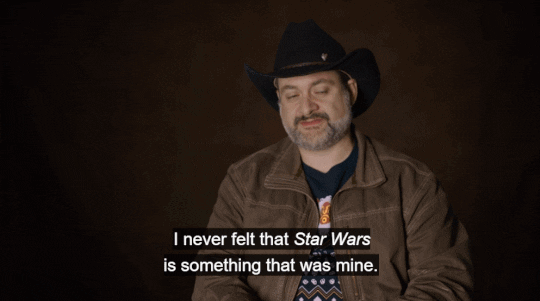


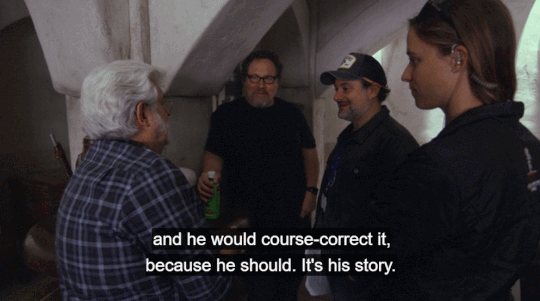
So, when I dig into this, I’m not doing this out of a sense of malice or even that I suddenly hate Dave or don’t appreciate all the incredible things he’s brought to SW, but in that I disagree with his take, Dave understands that he doesn’t always get it right, that he enjoys that fans come up with different things than he does and sometimes he likes those even more. There’s room for both of us and, for all that Dave mentions George a lot (and, hey, fair enough, the guy worked with George and I’m just quoting what George Lucas has said) doesn’t mean that this is straight from George, especially because I have never seen George Lucas utter so much as a peep about how the Jedi were responsible for Anakin’s fall. He has explicitly and frequently talked about how Anakin’s fall was his own choice, as well as I’ve never seen him say anything Jedi-critical beyond “they were kind of arrogant about themselves”. I have read and watched every George Lucas interview I could get my hands on and maybe I’m still missing something, but that’s literally the extent of him criticizing the Jedi I have EVER seen. (It’s from the commentary on AOTC where he put in the scene with Jocasta to show they were full of themselves, but I also think it’s fair to point out that Obi-Wan immediately contradicts this by going to Dex for help, showing that it’s not necessarily a Jedi-wide thing.) Before I go further, I want to say: this is not a post meant to tear down Qui-Gon, he is a character I actually really do love, but the focus is on showing why the above interpretation of him is wrong, which means focusing on Qui-Gon’s flaws. He has many wonderful qualities, he is someone who cared deeply and was a good person, I think things would have been better had he lived! But Anakin’s choices did not hinge on him, because Anakin’s choices were Anakin’s, that has always been the consistent theme of how George talks about him, the way he talks about the story is always in terms of “Anakin did this” or “Anakin chose that”, and the Jedi are very consistently shown as caring, they believed very much in love and Dave’s own show (well, I say “his own show”, but honestly TCW was George’s baby primarily and he had a lot of direct, hands-on say in crafting it, through at least the first five seasons) is plenty of evidence of that. I’m not going to quote the full thing because this is already a monster post, I’m just going to focus on the Jedi stuff, because I like the other points a lot, but if you want the full text, it’s here. The relevant part is: “In Phantom Menace, you’re watching these two Jedi in their prime fight this evil villain. Maul couldn’t be more obviously the villain. He’s designed to look evil, and he is evil, and he just expresses that from his face all the way out to the type of lightsaber he fights with. What’s at stake is really how Anakin is going to turn out. Because Qui-Gon is different than the rest of the Jedi and you get that in the movie; and Qui-Gon is fighting because he knows he’s the father that Anakin needs. Because Qui-Gon hasn’t given up on the fact that the Jedi are supposed to actually care and love and that’s not a bad thing. The rest of the Jedi are so detached and they become so political that they’ve really lost their way and Yoda starts to see that in the second film. But Qui-Gon is ahead of them all and that’s why he’s not part of the council. So he’s fighting for Anakin and that’s why it’s the ‘Duel of the Fates’ – it’s the fate of this child. And depending on how this fight goes, Anakin, his life is going to be dramatically different. “So Qui-Gon loses, of course. So the father figure, he knew what it meant to take this kid away from his mother when he had an attachment, and he’s left with Obi-Wan. Obi-Wan trains Anakin at first out of a promise he makes to Qui-Gon, not because he cares about him. When they get Anakin, they find him on Tatooine, he says “Why do I feel like we’ve found another useless lifeform?” He’s comparing Anakin to Jar Jar and he’s saying “this is a waste of our time, why are we doing this, why do you see importance in these creatures like Jar Jar Binks and this ten-year-old boy? This is useless.” “So, he’s a brother to Anakin eventually but he’s not a father figure. That’s a failing for Anakin. He doesn’t have the family that he needs. He loses his mother in the next film. He fails on this promise that he made, “mother, I’m going to come back and save you”. So he’s left completely vulnerable and Star Wars is ultimately about family. So that moment in that movie which a lot of people I think diminish, “oh there’s a cool lightsaber fight”, but it’s everything that the entire three films of the prequels hangs on, is that one particular fight. And Maul serves his purpose and at that point died before George made me bring him back, but he died.“ --Dave Filoni I’m going to take this a piece at a time to show why I really disagree with the content of both the movies and The Clone Wars supporting what Dave says and, instead, contradicts it a lot. The rest of the Jedi are so detached and they become so political that they’ve really lost their way and Yoda starts to see that in the second film. He doesn’t explain what this means, but I’m pretty sure that he’s referring to this conversation: OBI-WAN: “I am concerned for my Padawan. He is not ready to be given this assignment on his own yet.” YODA: “The Council is confident in its decision, Obi-Wan.” MACE WINDU: “The boy has exceptional skills.” OBI-WAN: “But he still has much to learn, Master. His abilities have made him... well.... arrogant.” YODA: “Yes, yes. A flaw more and more common among Jedi. Hmm... too sure of themselves they are. Even the older, more experienced ones.” MACE WINDU: “Remember, Obi-Wan, if the prophecy is true, your apprentice is the only one who can bring the Force back into balance.” OBI-WAN: "If he follows the right path.” None of that has anything to do with being “detached” and, further, I think this is something that’s come up with Dave’s view of Luminara a lot, because he’s described her (re: the Geonosis arc): “We were trying to illustrate the difference between the way Anakin is raising his Padawan, and how much he cares about her, and the way Luminara raises her Padawan. Not that Luminara is indifferent, but that Luminara is detached. It’s not that she doesn’t care, but she’s not attached to her emotionally.” Here, he says that the Jedi care, in the above, he says that the Jedi don’t care, which makes me think there’s a lot of characterization drift as time goes on, especially when fandom bombards everyone with the idea that the Jedi were cold, emotionless, and didn’t care. However, look at Luminara’s face in that arc, when she’s talking with Anakin:
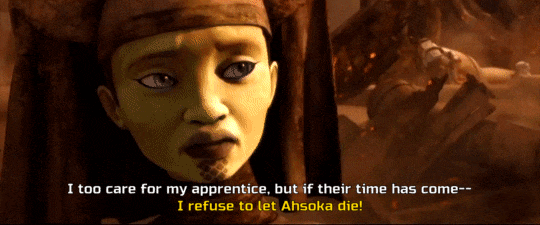
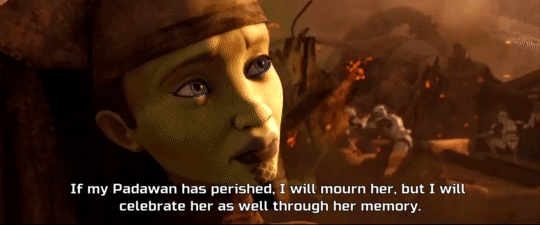
That is not the face of someone who doesn’t care. She even smiles brightly in relief when Barriss is shown to be okay, that this really doesn’t convey “detached” in an unloving or uncaring way. (We’ll get to attachment later, that’s definitely coming.) (I’m also mostly skipping the political thing, because I think that’s just a fundamental disagreement of whether Jedi should or should not lean into politics. My view basically boils down to that I think ALL OF US should be leaning more into politics because we are citizens who live in the world and are responsible for it, and the Jedi are no different. This is evidenced by: - M&A’s storyline has Qui-Gon and Obi-Wan saving the day specifically because they play politics, that’s how they manage to free the slaves, through playing politics and being part of the Republic/having Senate backing. - The Clone Wars has shown that the Jedi believe “lasting change can only come from within” and “it’s every citizen’s duty to hold their leaders accountable” when Ahsoka teaches the cadets on Mandalore, as well as that politics are not inherently bad, given that Padme and Bail are working to make the system better or “create lasting change from within [the system]” - "Trying to serve the greater good does not always make you popular” says Padme Amidala in a very caring speech - Star Wars Propaganda makes the case that the Jedi might have won the war had they leaned more into politics. - Sometimes the Jedi get unfairly accused of playing politics when there’s just no good choice and they still have to choose one or the other.) But Qui-Gon is ahead of them [re: caring and loving] all and that’s why he’s not part of the council. This is flat-out wrong in regards to canon. Mileages are going to vary, of course, on how much one takes a novel into consideration, but Dave Filoni is not a fan with the luxury of deciding what is or isn’t canon, he works on Star Wars where canon is canon. Now, does that mean canon will never contradict itself, especially if Dave gets to write something for Qui-Gon? Of course not, SW isn’t immune to continuity errors and they themselves have never said otherwise, even when fans want to hold them to that standard. However, this is still pretty much a big “that’s not what happened” instance. In Master & Apprentice, the Jedi Council offer a seat to Qui-Gon on the Council, specifically BECAUSE he has different opinions from them and they welcome that. (Excerpt here.) “We hope it will also be our gain,” Mace replied. “Qui-Gon Jinn, we hereby offer you a seat on the Jedi Council.” Had he misheard? No, he hadn’t. Qui-Gon slowly gazed around the circle, taking in the expressions of each Council member in turn. Some of them looked amused, others pleased. A few of them, Yoda included, appeared more rueful than not. But they were serious. “I admit—you’ve surprised me,” Qui-Gon finally said.“I imagine so,” Mace said drily. “A few years ago, we would’ve been astonished to learn we would ever consider this. But in the time since, we’ve all changed. We’ve grown. Which means the possibilities have changed as well.” Qui-Gon took a moment to collect himself. Without any warning, one of the turning points of his life had arrived. Everything he said and did in the next days would be of great consequence. “You’ve argued with my methods often as not, or perhaps you’d say I’ve argued with yours.” “Truth, this is,” Yoda said. Depa Billaba gave Yoda a look Qui-Gon couldn’t interpret. “It’s also true that the Jedi Council needs more perspectives.” Ultimately, Qui-Gon is the who turns them down and gives up a chance to shape the Jedi Council because he doesn’t like the shape they’re taking. That he does become less political, but this is after he’s argued that the Jedi should be working to push the Senate harder, so when he has a chance to help with that, he turns it down. It has nothing to do with caring and loving, it’s about Qui-Gon’s desire to not have to deal with the work himself, when he wants to be more of a hippie Jedi. (I’ve written a lot about Qui-Gon in M&A, why I actually think it’s really spot-on to someone who can be both really kind and really kind of a dick, but it’s not the most flattering portrayal, even if narrative intention likely didn’t mean what came across to me. I think this post and this post are probably the most salient ones, but if you want something of an index of the web that’s being woven with all the various media, this one is good, too.) So he’s fighting for Anakin and that’s why it’s the ‘Duel of the Fates’ – it’s the fate of this child. And depending on how this fight goes, Anakin, his life is going to be dramatically different. I have only ever seen George Lucas talk about Anakin’s fate in one instance and it’s this: “It’s fear of losing somebody he loves, which is the flipside of greed. Greed, in terms of the Emperor, it’s the greed for power, absolute power, over everything. With Anakin, really it’s the power to save the one he loves, but it’s basically going against the Fates and what is natural.“ –George Lucas, Revenge of the Sith commentary I’ve made my case about why I think Anakin’s fate is about that moment in Palpatine’s office, and so I’m not fundamentally opposed that “Duel of the Fates” is about Anakin’s fate, but here’s what George has provably said about the “Duel of the Fates” part of the story: - In the commentary for The Phantom Menace during “Duel of the Fates” and none of Dave’s speculation is even hinted at, there’s more focus on the technical side of things and the most George talks about is that it’s Obi-Wan who parallels Luke in going over the edge during the fight, except that instead of a Sith cutting off a Jedi’s hand, it’s a Jedi cutting a Sith in half, drawing the parallels between them. - He does say of the funeral scene that this is where Obi-Wan commits to training Anakin and how everything is going to go (though, in canon we see that Obi-Wan still struggles with this a bit, but Yoda is there to support him and nudge him into committing even more to Anakin, because the Jedi are a supportive community to each other). This is some solid evidence for that Obi-Wan is already caring about Anakin beyond just Qui-Gon. - Then here’s what he says about the “Duel of the Fates” fights and themes of them in "All Films Are Personal": George Lucas: “I wanted to come up with an apprentice for the Emperor who was striking and tough. We hadn’t seen a Sith Lord before, except for Vader, of course. I wanted to convey the idea that Jedi are all very powerful, but they’re also vulnerable — which is why I wanted to kill Qui-Gon. That is to say, “Hey, these guys aren’t Superman.” These guys are people who are vulnerable, just like every other person. “We needed to establish that, but at the same time, we wanted the ultimate sword fight, because they were all very good. It sort of predisposes the sword fight between Anakin and Obi-Wan later on. There’s real purpose to it. You have to establish the rules and then stick with them. The scene illustrates just how Jedi and Sith fight and use lightsabers.” “So Qui-Gon loses, of course. So the father figure, he knew what it meant to take this kid away from his mother when he had an attachment, and he’s left with Obi-Wan. Obi-Wan trains Anakin at first out of a promise he makes to Qui-Gon, not because he cares about him. We’ll get to the “attachment to his mother” thing in a bit--but, for now, let’s just say, George Lucas’ words on this are not that attachment to her was a good thing. Fair enough that “not because he cares about him” is up to personal interpretation, but canon has also addressed the topic of Obi-Wan’s treatment of Anakin and Obi-Wan stepped up to the plate on this. In addition to how we see Obi-Wan REPEATEDLY being there for Anakin and being concerned and caring about him, they specifically talk about Qui-Gon and overcome this hurdle.
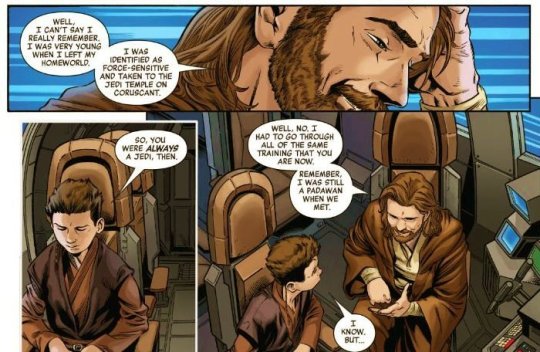
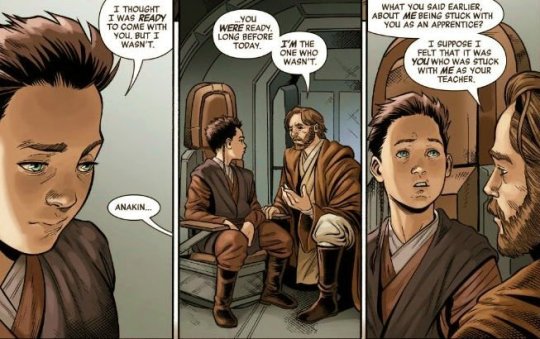
No, Obi-Wan is not Anakin’s father figure, on that we definitely agree. Anakin never really even treats Obi-Wan like a father--he says “you’re the closest thing I have to a father” in Attack of the Clones, as well as he says Obi-Wan practically raised him in The Clone Wars “Crystal Crisis” story reels, but Anakin has never actually acted like Obi-Wan is his father--”then why don’t you listen to me?” Obi-Wan points out in AOTC--as well as Obi-Wan glides past those remarks, which I’ve always taken that he doesn’t want to reject Anakin’s feelings, knowing that Anakin can be sensitive about them, but neither does he want to confirm them. This does not mean Obi-Wan was not supportive, caring, and loving. He says, “I loved you!” to Anakin in Revenge of the Sith, he asks after him and if he’s sleeping well in Attack of the Clones, and even George Lucas himself said that the elevator scene was set up TO SHOW OBI-WAN AND ANAKIN CARE FOR EACH OTHER:
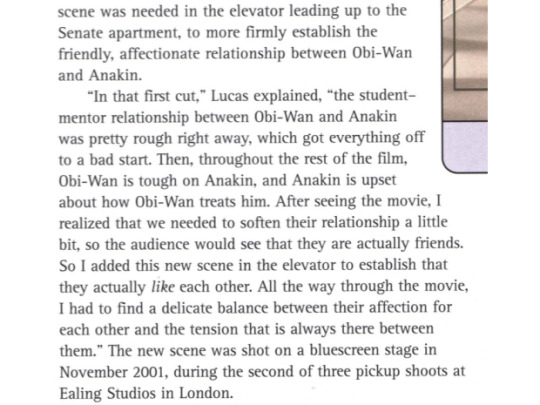
PUTTING THE REST UNDER A READ MORE FOR A BETTER LENGTH REBLOGGABLE VERSION, IF YOU WANT.
This is further evidenced by how the Jedi do see themselves as family, they just don’t need to put it into strict nuclear family dynamics: - “You were my brother, Anakin! I loved you!” [–Obi-Wan Kenobi, Revenge of the Sith] - “We are brothers, Master Dibs.” [–Mace Windu, Jedi of the Republic - Mace Windu] - “Did your parents bicker?” she asked. “The adoptive ones, I mean.” A slow smile broke across Ashla’s face, curling first one side of her mouth and then the other. Whatever she was remembering, Kaeden could tell it was good. "All the time,“ Ashla said, almost as if she were talking to herself. [–Kaeden Larte, Ahsoka Tano, Ahsoka] - Vos, brought to the Temple even younger than most, felt that he had hundreds of brothers and sisters, and it seemed that whenever he went into the dining hall he ran into at least half of them. [Dark Disciple] - “It was not his birthplace, exactly, but the Jedi Temple was where Quinlan Vos had grown up. He’d raced through its corridors, hidden behind its massive pillars, found peace in its meditation hall, ended-and started-fights in rooms intended for striking blows and some that weren’t, and sneaked naps in its library. All Jedi came here, at some point in their lives; for Quinlan, it always felt like coming home when he ran lightly up the stairs and entered the massive building as he did now.” [Dark Disciple] Brothers, sisters, and other more non-traditional kinds of family are not lesser and Obi-Wan and Anakin absolutely were family, just as the Jedi are all family to each other, so, no, there was no “failing” Anakin, except in Anakin’s mind, perhaps. (In that, I can agree. But not on a narratively approved level, canon too thoroughly refutes that for me.) Rebels as well pretty thoroughly shows that non-traditional families are meaningful and just as important--we may joke that Hera is “space mom”, but she’s not actually Ezra or Sabine’s mother, Kanan is not actually their father, and even if they sometimes stray into aspects of those roles (as the Jedi do as well in the movies and TCW), that they don’t need that traditional nuclear family structure. Mentor figures--and Kanan is Ezra’s mentor--are just as meaningful and needful as a “dad”. And I’m kind of :/ at the implication that anyone without a dad/father figure or mom/mother figure is being “failed”. When they get Anakin, they find him on Tatooine, he says “Why do I feel like we’ve found another useless lifeform?” He’s comparing Anakin to Jar Jar and he’s saying “this is a waste of our time, why are we doing this, why do you see importance in these creatures like Jar Jar Binks and this ten-year-old boy? This is useless.” Whether or not Obi-Wan is being genuinely dismissive in this movie (I think you could make a case either way), the idea that Qui-Gon is better than Obi-Wan about this, as shown through Jar Jar isn’t exactly very supported given how Qui-Gon and Jar Jar first exchange words:

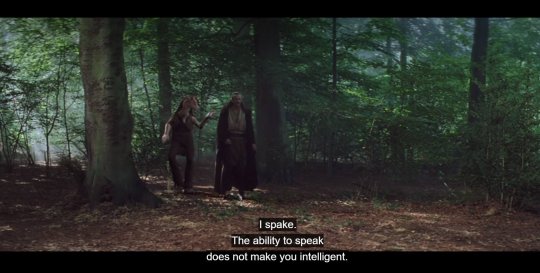
QUI-GON: “You almost got us killed. Are you brainless?” JAR JAR: “I spake.” QUI-GON: “The ability to speak does not make you intelligent.” Qui-Gon is just as bad as everyone else to Jar Jar, he’s not somehow elevated above them. It’s also baffling because, Dave, I have watched your show. The Jedi are specifically shown to be kind to people and creatures, not considering them “useless”. Henry Gilroy (who was the co-writer for The Clone Wars and frequently appeared in featurettes on the same level as Dave Filoni) explicitly draws this to The Jedi Way, that “life is everything to the Jedi“, when he said this about the Ryloth episodes:
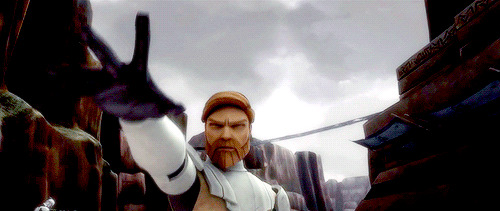
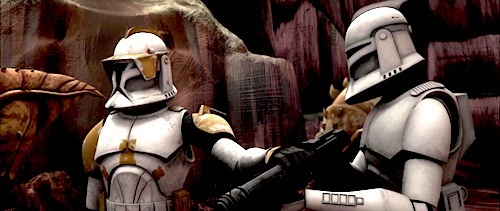
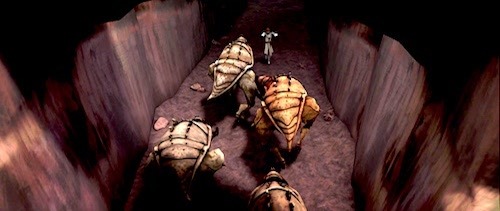
(Caps cribbed from Pan’s blog, because I cannot make another gif, save me, please.) Henry Gilroy in an Aggressive Negotiations Interview: "Obi-Wan truly is a Jedi in that he’s like, ‘Okay, I’m not going to murder these creatures [in the Ryloth arc of The Clone Wars]. They’re starving to death. They’ve basically been unleashed against these people as a weapon, but it’s not their fault. They’re just doing what they do. They’re just animals who wanna eat.’ "So the idea was–and I think there was an early talk about how, 'Oh, yeah, he’ll go running through them and slicing and dicing them and chop them all up or whatever, and save his guys. And I’m like, 'Yeah, but that’s not really the Jedi way. He’s not just gonna murder these creatures.’ "And I know the threat is [there], to save one life you have to take one, but the idea of him [is]: why can’t Obi-Wan just be more clever? He basically draws them in and then traps them. "It says something about who the Jedi are, they don’t just waste life arbitrarily. And someone could have gone, 'Oh, yeah, but it would have been badass if he’d just ran in there with his lightsaber spinning and stabbed them all in the head!’ And 'Yeah, you’re right, I guess he could be that, but he’s trying to teach his clones a lesson right then, about the sanctity of life.’ "That is the underlying theme of that entire episode. Which is: A tactical droid is using the people as living shields. Life means nothing to the Separatists. The droids. But life is everything to the Jedi. And even though he doesn’t have to say that, it’s all through the episode thematically.“ It’s also Obi-Wan who teaches Anakin about kindness to mindless creatures in the Obi-Wan & Anakin comic:

"These beasts are nearly mindless, Anakin. I can feel it. They are merely following their nature, they should not die simply because they crossed our path. Use the Force to send them on their way.” Now, fair enough if you want to say Obi-Wan was taught by Qui-Gon, but also Qui-Gon is dead by that point and Obi-Wan growing into being more mature is his own accomplishment, not Qui-Gon’s, especially given that we see Qui-Gon himself being pretty dismissive to Jar Jar in TPM. This isn’t unique thing either, Padme is incredibly condescending to Jar Jar in “Bombad Jedi” and expresses clear annoyance with him to C-3PO when sighing over him. Jar Jar is a character you kind of have to warm up to, pretty much the only one we’ve seen consistently being favorable to him is Yoda (and maybe Anakin, though, Anakin doesn’t really interact with him a ton) and Mace Windu warms up to him considerably in “The Disappeared” and even specifically is shown to be teaching him and helping him, which is a huge theme of the Jedi and how much they care.
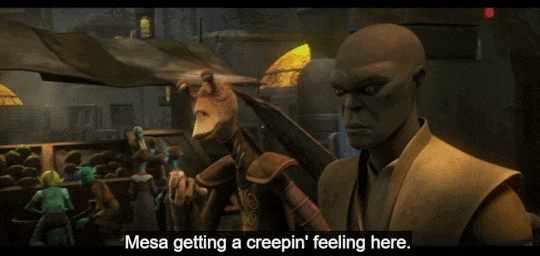
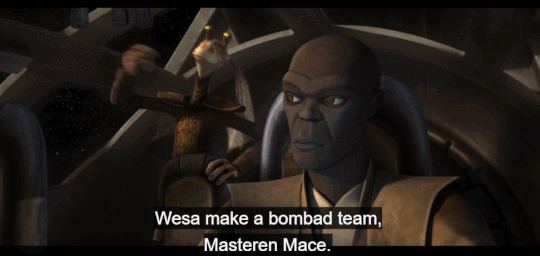
So, ultimately, the point I’m winding my way towards is--the other Jedi do show kindness and consideration to Jar Jar Binks, including characters like Mace Windu, so if you’re judging the Jedi based on that, the conclusion of Qui-Gon somehow being more compassionate and loving is really pretty thoroughly disproved by The Phantom Menace and The Clone Wars themselves. So, he’s a brother to Anakin eventually but he’s not a father figure. That’s a failing for Anakin. He doesn’t have the family that he needs. He loses his mother in the next film. He fails on this promise that he made, “mother, I’m going to come back and save you”. So he’s left completely vulnerable and Star Wars is ultimately about family. You could be charitable and say this is just from Anakin’s point of view that it’s a “failing”, but within the context of what Dave’s saying, it’s clearly meant as a more narratively approved take, not just Anakin’s point of view, and I really, really dislike the idea that Anakin--or anyone, really--needs a traditional nuclear family, ie a “mom” and/or a “dad”, or else it’s a “failing” for them. Setting aside that the idea that Qui-Gon would need to be Anakin’s dad to be kind to hi (which is ?????) is contradicted by The Clone Wars as well. Yes, Qui-Gon is warm with Anakin in several scenes, which is what Dave is presumably drawing on to show that Qui-Gon believed the Jedi should be caring and loving, but you know who else is warm to younglings? OTHER JEDI COUNCIL MEMBERS.
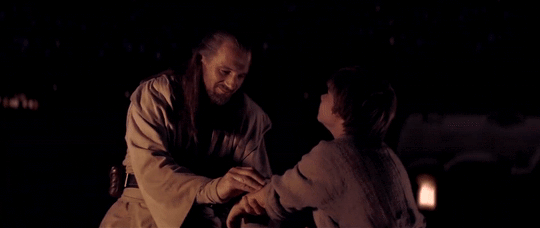
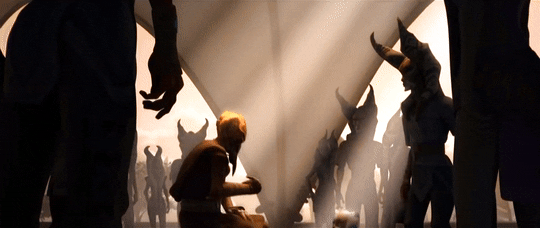
Those two scenes have the exact same kind of warmth to them. Ie, THE JEDI ALL BELIEVED IN BEING LOVING AND KIND, NOT JUST QUI-GON. The things evidenced to show Qui-Gon was loving and kind are evidenced just as much in other Council members, in Dave’s own show. As a bonus--have Mace Windu, known Jedi Council member, being super kind and loving towards a young Twi’lek girl he just met in a canon comic:
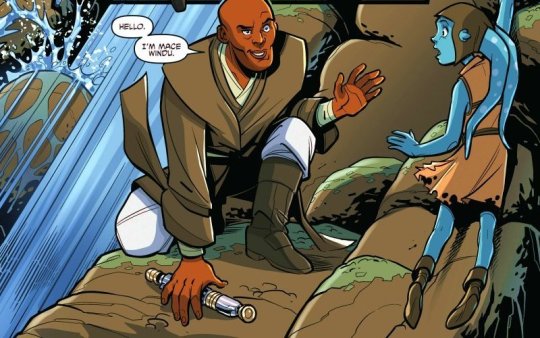
But I know that this is about the way the Council treated Anakin in The Phantom Menace testing scene, but here’s the thing--when I go back and I watch that scene and the Jedi aren’t ever mean to him, they’re neutral in an official testing situation, where they are trying to determine if he’s able to adapt to the Jedi ways. They never once say he’s bad for holding onto his fear, only that he does--which Anakin digs his heels in and gets angry about, he can’t really even admit that he’s afraid and that’s a huge deal for the Jedi. I’ve made a longer post about it here (and here), but the basic gist is: - That scene has Yoda giving the famous “Fear leads to the dark side” speech which is almost word for word how George Lucas describes how the Force works, showing the Jedi are narratively correct - “Confronting fear is the destiny of a Jedi” may be from the sequels, but it is thoroughly supported by the movies and TCW and Rebels and even supplementary canon material, including that the Jedi literally design their tests around both Masters and Padawans for it (Ilum, the Jedi Temple on Lothal, etc. - Anakin cannot admit to his fears in that TPM scene - We have examples of Jedi younglings do admit to their fears and the point isn’t not to have them, but to face them--the younglings in “The Gathering” are the most blatant example of this, but it’s also pretty much the entire theme of Jedi: Fallen Order, especially when Cal goes to Ilum to face his fears and get another kyber crystal. The point isn’t that Anakin--who has very good reasons to be afraid! nothing in the story or the Jedi have said he didn’t!--is wrong or bad, but that he’s not a great fit for the Jedi life because he is “unwilling to accept [Jedi philosophy] emotionally”. And they’re right about this, because this is how George Lucas describes Anakin in commentary: “The fact that everything must change and that things come and go through his life and that he can’t hold onto things, which is a basic Jedi philosophy that he isn’t willing to accept emotionally and the reason that is because he was raised by his mother rather than the Jedi. If he’d have been taken in his first year and started to study to be a Jedi, he wouldn’t have this particular connection as strong as it is and he’d have been trained to love people but not to become attached to them.” --George Lucas, Attack of the Clones commentary And so this brings us to A T T A C H M E N T, which, yeah, we’ve been having this discussion forever, but I’m going to state it again: Within Star Wars, ATTACHMENT IS NARRATIVELY A BAD THING. It is consistently tied to possessive, obsessive relationships, to greed and an unwillingness to let things go when it’s time (letting go is a huge theme in Star Wars) and equating love with attachment is fundamentally wrong according to George Lucas’ Star Wars worldbuilding: “The Jedi are trained to let go. They’re trained from birth,” he continues, “They’re not supposed to form attachments. They can love people-- in fact, they should love everybody. They should love their enemies; they should love the Sith. But they can’t form attachments. So what all these movies are about is: greed. Greed is a source of pain and suffering for everybody. And the ultimate state of greed is the desire to cheat death.” --George Lucas, The Making of Revenge of the Sith If attachment and love were the same thing, then he would be saying, “They should love their enemies, they should love the Sith. But they can’t love.” The way George makes the distinction shows that, no, attachment and love aren’t the same thing at all, attachment is not caring. Further, there’s another instance of him showing there’s an important distinction between relationships and attachment and the association of attachmets with possession: "Jedi Knights aren’t celibate - the thing that is forbidden is attachments - and possessive relationships.” --George Lucas, BBC News interview So, yes, when Anakin is attached to people, it is directly tied to obsession, possession, and greed, all things of the dark side: “He turns into Darth Vader because he gets attached to things. He can’t let go of his mother; he can’t let go of his girlfriend. He can’t let go of things. It makes you greedy. And when you’re greedy, you are on the path to the dark side, because you fear you’re going to lose things, that you’re not going to have the power you need.” --George Lucas, Time Magazine “But he has become attached to his mother and he will become attached to Padme and these things are, for a Jedi, who needs to have a clear mind and not be influenced by threats to their attachments, a dangerous situation. And it feeds into fear of losing things, which feeds into greed, wanting to keep things, wanting to keep his possessions and things that he should be letting go of. His fear of losing her turns to anger at losing her, which ultimately turns to revenge in wiping out the village. The scene with the Tusken Raiders is the first scene that ultimately takes him on the road to the dark side. I mean he’s been prepping for this, but that’s the one where he’s sort of doing something that is completely inappropriate.“ --George Lucas, Attack of the Clones commentary ATTACHMENT IS BAD IN STAR WARS AS THEY DEFINE IT. Finally, I’m going to circle back to: Because Qui-Gon is different than the rest of the Jedi and you get that in the movie; and Qui-Gon is fighting because he knows he’s the father that Anakin needs. Because Qui-Gon hasn’t given up on the fact that the Jedi are supposed to actually care and love and that’s not a bad thing. Here’s the thing about this: You know who else, by this logic, Qui-Gon should have been a father to? OBI-WAN KENOBI. This isn’t said as “Anakin specifically needs a father” (which I think would be an interesting idea to bandy about and I’m not disagreeing, though, it’s complicated because of what Anakin refuses to accept emotionally), it’s said in a bigger context, that Qui-Gon is better than the other Jedi because he understands the need for fathers (and thus this ties into Return of the Jedi) and he’s ahead of the other Jedi, who apparently think loving and caring about people are bad things, but Qui-Gon does not treat Obi-Wan like his son. Or, if he does, he’s not exactly a stellar dad about it. Within Master & Apprentice, there’s an incredibly consistent theme of how Qui-Gon thinks supportive things about Obi-Wan, but never says them aloud. He thinks he should talk to Obi-Wan about the upcoming decision to be on the Council and then never does. He could have explained why he kept Obi-Wan training the basics but he never does. There are multiple instances showing that Qui-Gon is actually really, really bad at actually handling a young apprentice who needs him to talk to them about important things. Qui-Gon continues this in From a Certain Point of View where he still never talked to Obi-Wan about everything that happened, even after he became a Force Ghost. Damn, damn, damn. Qui-Gon closed his eyes for one moment. It blocked nothing; the wave of shock that went through Obi-Wan was so great it could be felt through the Force. Qui-Gon hadn’t thought Kirames Kaj would mention the Jedi Council invitation. It seemed possible the soon-retiring chancellor of the Republic might not even have taken much note of information about a new Council member. --Master & Apprentice That comment finally pierced Qui-Gon’s damnable calm. There was an edge to his voice as he said, “I suspected you would be too upset to discuss this rationally. Apparently I was correct.” “I thought you said my reaction was understandable,” Obi-Wan shot back. “So why does it disqualify me from hearing the truth?” Qui-Gon put his hands on his broad belt, the way he did when he was beginning to withdraw into himself. “…we should discuss this at another time. Neither of us is his best self at the present.” --Master & Apprentice Obi-Wan walked toward the door, obviously outdone. “At the beginning of my apprenticeship, I couldn’t understand you,” he said. “Unfortunately, that’s just as true here at the end.” Only yesterday they had worked together as never before. How did Qui-Gon manage to get closer to Obi-Wan at the same time he was moving further away? Just before Obi-Wan would leave the room, Qui-Gon said, “Once, you asked me about the basic lightsaber cadences. Why I’d kept you there, instead of training you in more advanced forms of combat.” Obi-Wan turned reluctantly to face him again. “I suppose you thought I wasn’t ready for more. The same way I’m not ready to believe in all this mystical—” “That’s not why.” After a long pause, Obi-Wan calmed to the point where he would listen. “Then why, Qui-Gon?” “Because many Padawans—and full Jedi Knights, for that matter—forget that the most basic technique is the most important technique. The purest. The most likely to protect you in battle, and the foundation of all knowledge that is to come,” Qui-Gon said. “Most apprentices want to rush ahead to styles of fighting that are flashier or more esoteric. Most Masters let them, because we must all find our preferred form eventually. But I wanted you to be grounded in your technique. I wanted you to understand the basic cadences so well that they would become instinct, so that you would be almost untouchable. Above all, I wanted to give you the training you needed to accomplish anything you set your mind to later on.” Obi-Wan remained quiet for so long that Qui-Gon wondered if he were too angry to really hear any of what he’d said. But finally, his Padawan nodded. “Thank you, Qui-Gon. I appreciate that. But—” “But what?” “You could’ve said so,” Obi-Wan replied, and then he left. --Master & Apprentice "I owe you that. After all, I’m the one who failed you.“ "Failed me?” They have never spoken of this, not once in all Qui-Gon’s journeys into the mortal realm to commune with him. This is primarily because Qui-Gon thought his mistakes so wretched, so obvious, that Obi-Wan had wanted to spare him any discussion of it. Yet here, too, he has failed to do his Padawan justice. --From a Certain Point of View, “Master and Apprentice” (Further, in Master & Apprentice, Qui-Gon thinks that the Jedi give Rael Averross--who is HUGELY paralleled to Anakin--too many exceptions, were too soft on him because he came to the Jedi later than most and has trouble thinking of them as his family, and he thinks they should have been stricter with him.) It’s also readily apparent within The Phantom Menace itself:
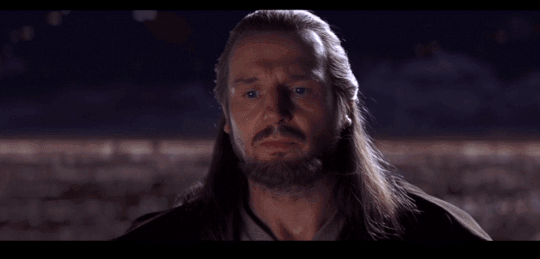
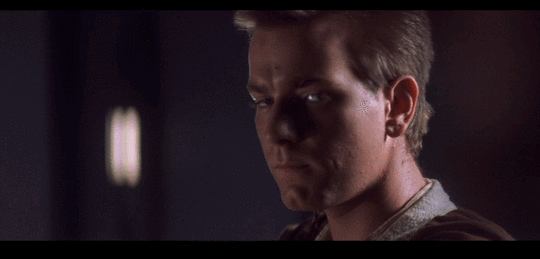
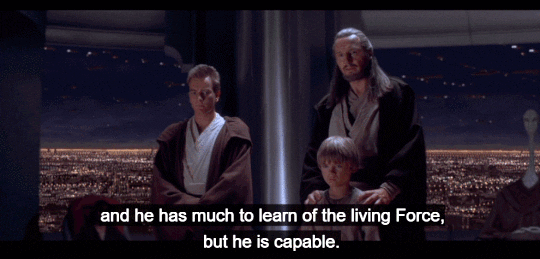

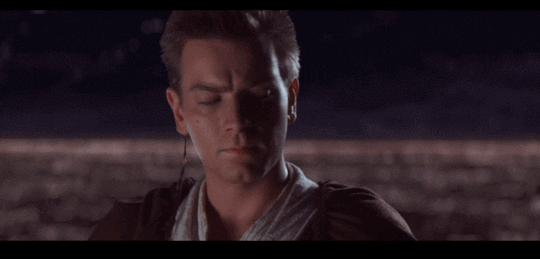
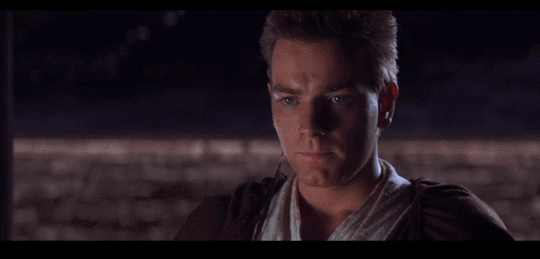
You can take some charitable views of this scene, that Qui-Gon was pushed into a corner where he had few other options (and this is the view I generally take even!), but this is after the entire movie where he’s never once indicated that Obi-Wan was ready, has instead indicated that he still has much to learn (not just of the Living Force, but in general), as well as made it clear that he’s still teaching Obi-Wan, like on the Trade Federation ship. And I do think Obi-Wan got over this because he understood, because Obi-Wan actually is a very selfless person, he clearly cares (which is furthered by how we see him warm up to Anakin very quickly), but look at their faces. This was not a good moment, and they do somewhat make up, where Qui-Gon says that Obi-Wan has been a good apprentice, that he’s wiser than Qui-Gon and he’ll be a great Jedi--but if we’re counting that as Qui-Gon being this great Jedi, then you can’t say Obi-Wan failed Anakin, given that we show him doing the exact same thing, except better. He tells Anakin, “You are strong and wise and will become a far greater Jedi than I could ever hope to be.”, echoing Qui-Gon’s words, but also he never threw Anakin aside for someone else. This is kind of a major undercurrent throughout The Clone Wars, where Obi-Wan never takes another apprentice, where he continues to teach Anakin, to support him, even to the point of occasionally co-Mastering Ahsoka with him. “This has been quite a journey for our Padawan.” Qui-Gon’s treatment of Obi-Wan in this scene isn’t the worst, he’s kind about it later (though, he never actually specifically apologizes for this), but we can see that this is a moment where Qui-Gon hurts Obi-Wan and knows it. And you know what George Lucas has to say about Qui-Gon? This: “So here we’re having Qui-Gon wanting to skip the early training and jump right to taking him on as his Padawan learner, which is controversial, and ultimately, the source of much of the problems that develop later on.” –George Lucas, The Phantom Menace commentary There’s nothing about Qui-Gon being right or better than the other Jedi, but instead that Qui-Gon’s actions here are a source of much of the problems that develop later on. So, ultimately, I liked some points Dave made in that speech, it’s a beautiful and eloquent one, but I thoroughly disagree with his interpretation of George’s intentions for Qui-Gon and I thoroughly disagree that that’s what the movies, The Clone Wars (DAVE’S OWN SHOW), and the supplementary canon show about Qui-Gon and the other Jedi. I still stand by my appreciation of Dave’s contributions to SW as a whole, I think he does a really good job at making Star Wars, but he doesn’t always get everything right and this is one thing where I think the canon and George’s commentary show otherwise, as much as I love his desire to defend the prequels’ importance in the story. Because, my friend, I have felt that every single day of my SW life.
996 notes
·
View notes
Text
@sunheart wrote in her tags on another post:
Genuinely hate being alive ... I completely understand on so many levels why you would hate being a woman. Its horrible. And then as a Christian there's this whole really ugly dynamic- that i know is probably a lie i just haven't worked out how yet- that we're the 2nd best. The afterthought. The mediocre option. Almost everything in life men are better at and it's hard to believe it's just cultural- math logic leadership writing cooking writing physical activities on and on, and women are good at being Nice :) Which ok i like being nice but it's like that's my only option I feel like any other impact i might wish to have upon the world will be paltry in comparison to what i could do if only i was a man. I feel incompetent. Irrational. Emotional. Obnoxious. I feel like I'm supposed to be a plaything for the beings that were *actually* created to be in harmony with God like I'm not supposed to have a connection with God- only through my husband which what does that make me as a single childless bitch? I can't even fulfill the main point of my existence. Jesus interacted with women but did he care about them like he did the men? David and John were named his favorites not Deborah or Hannah. And like i said i'm sure none of that's true but i don't know how and it feels awful. hate it.
Hopefully others have shared encouragement on this already, but just in case I wanted to give some thoughts. Please know that if I sound riled at all (and I’m going to try to avoid that) I’m not upset at anyone who feels this way but am deeply upset by the enemy’s lies that so many are hurt by. As a younger believer I did struggle with some of these questions myself, and for a long time it was difficult to reconcile these concerns with the promises that God loves me.
Your instincts are right - it is a lie that women are second best. And before I go any further let me also agree that yes, we are physically weaker than men and have other weaknesses too. But since when has weakness meant that someone is any way “less than” others? Men have weaknesses too, just different ones. That’s the nature of humanity: every person is a mixed bag of strengths and weaknesses. I’ve never heard before that men are better at cooking?? My dad literally struggles to cook a hotdog in the microwave and has never touched a grill in his life. And okay men may (possibly, not sure on this one either) be inherently better at math, but which gender is drastically underrepresented in the nursing field? I suspect there are fewer male teachers, too, though not as huge a disparity. Men are more prone to recklessness and violence - part of the reason married men live longer (gotta get that stable influence). Again yes men are physically stronger but have you watched ballet dancers (oooh i mean ballerinas, sorry there’re so few ballerinos that I forgot to differentiate) or female gymnasts? Nothing “less than” there! The famous Proverbs 31 woman is a good insight into Biblical support of female abilities and value: “strength and dignity are her clothing”, “she opens her mouth with wisdom, and the teaching of kindness is on her tongue.” “Let her works praise her in the gates.” (The gates were essentially the city hall or forum of ancient Israel.)
Going back to the beginning - women were created second, true. But did God not know His own plan? He was always going to create women. And the really amazing thing that I learned in the last couple of years is that, when God says He’s going to make Adam “a helper” (Hebrew ”ezer”), that’s the same word that is used to describe God’s actions for His people throughout the Old Testament: - Exodus 18:4 “The God of my father was my help.” - 1 Samuel 7:12 “Ebenezer” means “rock of help” and is a memorial of Yaweh’s help. - Psalm 30:10 “Hear, O Lord, and be merciful to me! O Lord, be my helper!” - Psalm 115:11 “You who fear the Lord, trust in the Lord, He is their help and their shield” - Psalm 121:2 “My help comes from the Lord” - Hosea 13:9 “‘You are against Me, against your helper.’“
It is a common word for “help” used in other settings, yes, but the fact that it’s used of God illustrates that this is no poor or second-rate role. Helping - aiding - supporting - incredibly important! In fact this article I just found puts it this way:
In two cases it refers to the first woman, Eve, in Genesis 2. Three times it refers to powerful nations Israel called on for help when besieged. In the sixteen remaining cases the word refers to God as our help. He is the one who comes alongside us in our helplessness. That's the meaning of ezer. Because God is not subordinate to his creatures, any idea that an ezer-helper is inferior is untenable. In his book Man and Woman: One in Christ, Philip Payne puts it this way: "The noun used here [ezer] throughout the Old Testament does not suggest 'helper' as in 'servant,' but help, savior, rescuer, protector.'
Moving on to the New Testament, and the topic of John, who is known as “the disciple whom Jesus loved”. John is the one who wrote the book which tells us that (under the direction of the Holy Spirit, yes) and he only uses that wording as a title, in place of his name. Nowhere does it say he was the favorite disciple, or even most loved, just that he was loved. To me it seems more as if John is saying “Jesus loved me! Can you believe it?!” It has a feeling of awe and thankfulness as opposed to superiority.
Getting into marriage specifically, I do believe that a wife should be under the headship of her husband ...mainly in the sense of letting him have the last word on decisions and plans. This is in part due to differing areas of strength, and in part because in some situations it’s better to have a family leader - most groups of humans need a leader, and following an assigned (or picked) leader does not make one inferior. All that being said, a wife should be able to provide input, advice, and feedback to her husband, who should take into strong consideration his wife’s needs, insights, and concerns (Ephesians 5:25-29).
The lie that women cannot be connected to God outside of their husband is refuted not only by all the vibrantly faithful single or windowed Christian ladies of history (Amy Carmichael, Gladys Aylward, Mary Slessor, and Elisabeth Elliot are some of my favorites) but also Scripture itself. When Christ spoke with the divorced Samaritan woman the disciples were shocked not because she was a Samaritan but because she was a woman (John 4:27; she was shocked on both counts - John 4:9) - I hope they got used to it because Jesus spoke with women a lot. Despite the culture of the time, Jesus clearly had very warm and caring direct relationships with Martha and Mary, Mary Magdalene, and other women. Anna the Prophetess in the temple had been widowed for decades and was serving God alone “night and day” (Luke 2:37). Incredibly, in a culture where women were looked down upon, the Lord chose women to be the first to discover the empty tomb, and Mary Magdalene to be the first to see the risen Christ! I love that passage so much (John 20:11-18).
Another example is when Jesus stopped on His way to heal Jairus’ daughter (i.e. He put aside a powerful man’s urgent request) to lovingly interact with the woman who’d suffered bleeding for years - a terribly personal and female problem (Mark 5:21-35).
To try to wrap up, I’ll return to David in the OT, who was a “man after God’s own heart”. But again, it doesn’t say that he was actually a favorite - it does say David was chosen by God though, to lead Israel and establish the family from which Jesus would ultimately come. You know who else was chosen? Esther - “for such a time as this”. Once she realizes the task she must complete, she tells Mordecai how it’s going to go, and “Mordecai then went away and did everything Esther had ordered him.” Esther gets a book named after her and is remembered in the holiday of Purim to this day. Also note that Esther was married to an unbeliever. Likewise Ruth was chosen, as a young foreign widow, to be part of the Messiah’s kingly line. As an aside, my favorite thing about Ruth’s story (besides all the faith and beauty of it) is the simultaneous deep respect and protectiveness Boaz shows towards her (okay enough mush). Anyhow what it comes down to is that God chooses and loves both men and women, and both have a place (singly and married) in His plans and kingdom. See also Galatians 3:28 “ There is neither Jew nor Greek, there is neither slave nor free, there is no male and female, for you are all one in Christ Jesus.”
This post has all over the place, and I probably forgot a bunch of things I wanted to add (if anything else comes to mind I’ll add it later), but I hope it’s been encouraging. Yes I’ve struggled with some aspects of how women are portrayed in the Bible, but what I shared above, plus the love and blessings I’ve known as a single woman are more than enough evidence that we are known and loved. If anything is unclear or anyone has any questions please speak out/send an ask! Anon asks are on too. Also if anyone wants to add or amend anything do so without hesitation!!
24 notes
·
View notes
Text
I continue to see a lot of takes on Dunn and Parker and I continue to have opinions but I don’t want to add to that already mile-long post, so:
Yes, layouts CAN be plagiarized
I know that not everyone is a huge page design nerd but my job at the local paper was doing page layout and I had a literal stack of awards three feet high for doing page layout for newspapers and magazines in college and my rinky-dink little community college magazine got nominated for the same design award as Harvard’s college magazine did (though neither of us won). I am a big old page design nerd.
And I’ve seen page design plagiarism! It was a thing that came up when I was working at yearbook camp (because I am such a big page design nerd that one of my first jobs out of high school was TAing at a yearbook camp). There’s a difference between being *inspired by* and *straight ripping off* and sometimes people DO straight rip off page layouts.
Now, it would be difficult to say “well, a full bleed double-page photo with a white sans-serif font across it is MY idea, you can’t use it!” because something like that WOULD be pretty fundamental.
But I *would* say “two column layout with long, dense paragraphs and closely-placed, bold headers centrally aligned with ink drawings of pens at a 45 degree angle and illustrations of the types of marks each pen makes” *IS* specific enough that you can say someone copied that design.
But you can’t say that if the person who “copied” the design has a central column of text with short paragraphs that have widely spaced headers which is bracketed by two rows of pens at 45 and 135 degree angles.
So layout plagiarism is a thing but it is not a thing that I see evidence of between these two books.
“But the way they teach these things is identical”
We have maybe two thousand (being generous) words of clear text from Parker’s book. The “application” page is one of those and Dunn specifically comments on Parker’s use of Form and Contour and compares them to his own use of “cross contour”
Now, I *do* have an issue with people saying “there are only so many words you can use to describe fundamentals” because there are thousands of possible ways that you can describe anything and that’s not the issue - the issue is that both of these people are providing DEFINITIONS for terms and definitions, by definition, are definitive.
Contour is a word that has a definition. Mark is a word that has a definition. Variety is a word that has a definition. Form is a word that has a definition. These terms additionally have industry-specific definitions that are even narrower than the decontextualized definitions of the words.
One of the places that Dunn goes most in-depth on this is his discussion of how long it took him to define and articulate what “consistency” means. This is one of the things that people are citing when they say that Parker is teaching the exact same way.
Dunn says “It took me a long time to develop this idea - what you’re seeing here on one page is a distillation of several pages and months of deliberating with myself and deciding and trying to clarify the idea - when you say be consistent, what do you mean?” and came to “spacing, weight, sizing, direction.”
Parker’s page has “[illegible with three bars of different values], Length, [illegible except for the words “far apart” over variably spaced lines], Direction.”
I don’t even know that Parker actually SAYS weight, he may say “shade” or “value” because he word is illegible.
Regardless, here’s a book over a century old talking about how to illustrate texture: Length, weight, spacing, direction. 1899.
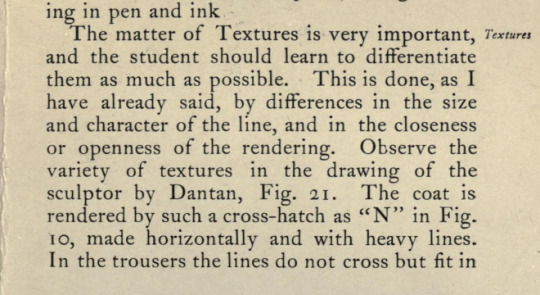
NONE of these three things (Dunn’s page “Keep Strokes Consistent,” Parker’s page “Consistently in Lines” and McGinnis’s comment on using varied strokes to render texture) but all three of these things rely on the same principles. Also Dunn has repeatedly said that his page on consistency is part of his chapter on shading and Parker’s is in a chapter called “Style and Technique.” In fact Dunn criticizes Parker for putting this in the wrong place because he (Parker) doesn’t understand where it goes and put it in the wrong place because he stole it without understanding it.
FROM WHAT HAS BEEN SHOWN SO FAR OF BOTH BOOKS these are not identical teaching styles. If there is significant overlap beyond sequencing and common terms it’s difficult to tell because we can’t read it; but it’s also frustrating to see Dunn’s sober, clear, technical drawing book held up as identical to one that seems to be narrated by cartoon bears. That alone should suggest that the underlying pedagogy is different.
But the sequence is too exact!
One of the examples of this that people are really harping on is the flip-through from Materials (with the illustration of pens), Additional materials (with the pencil, eraser, rulers, and dust brush), and then the movement to pen control.
Here’s page 10 of “Drawing with Pen and Ink,” in the chapter about requisite materials.

Here is page 12, with an eraser and ruler:
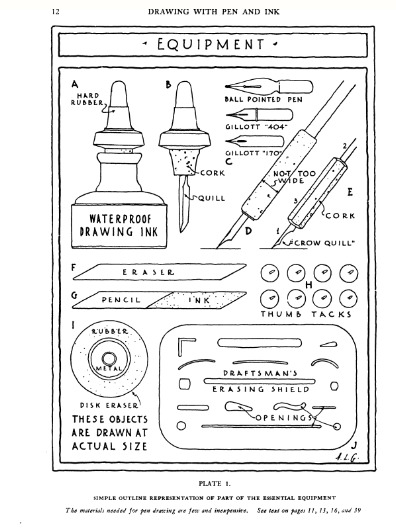
Here is page 17 with inkholders and a dust brush:

That is immediately followed by pen handling (so, you know, control):

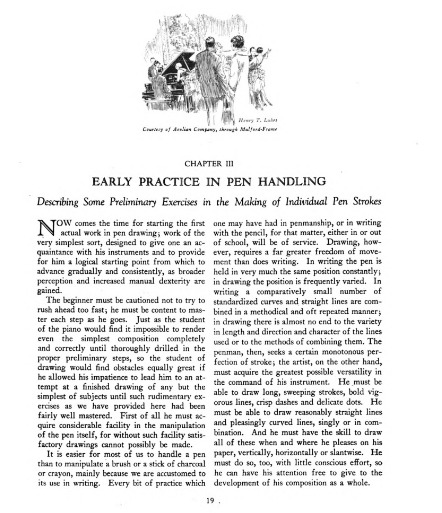
Then into basic strokes:
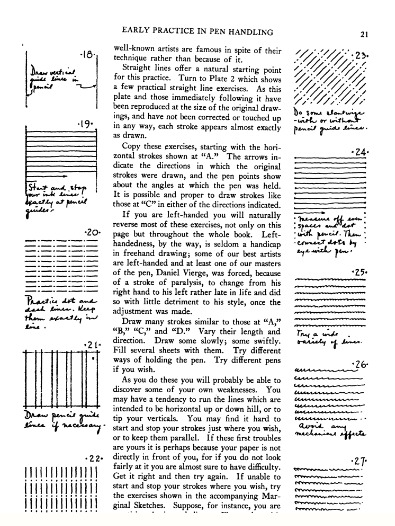
Then into how to vary a stroke:
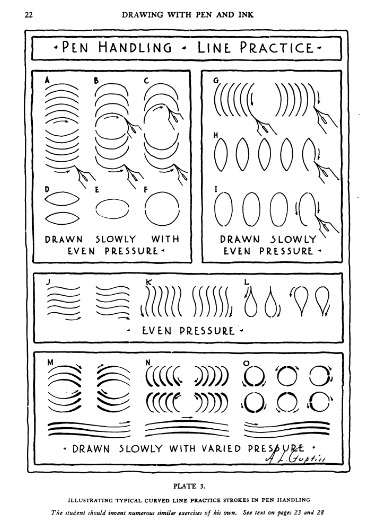
I don’t know what the exact sequence of Style and Technique is in Parker’s book is because we’ve only seen a few isolated pages, but here’s the ToC for Arthur L. Guptill’s “Drawing with Pen and Ink” from 1928

And here’s the ToC for Dunn’s “Pen and Ink Drawing”
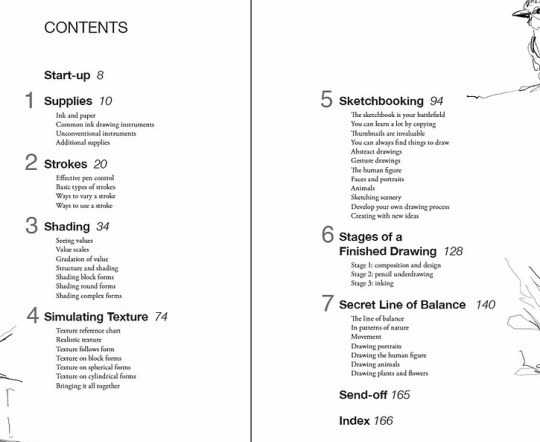
The sequence of “Drawing in Pen and Ink” for chapters 1-9 and the sequence of the first three chapters of “Pen & Ink Drawing” have a huge amount of overlap - the rest of the books do too, but the introductory chapters especially are REMARKABLY similar.
Here’s the table of contents of Pen Drawing, an Illustrated Treatise, from 1899:

Does this mean that Alphonso Dunn plagiarized his work? Of course not! And I saw some comments on the other post I made about Julianna Kunstler needing some credit but, really, she doesn’t. This is just really, really, really standard technique stuff that is super common.
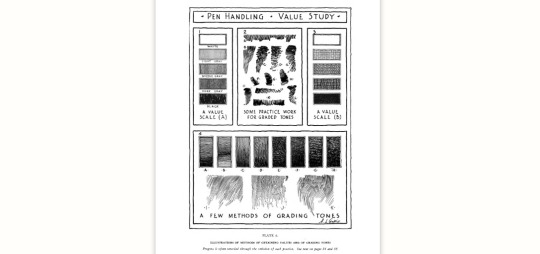
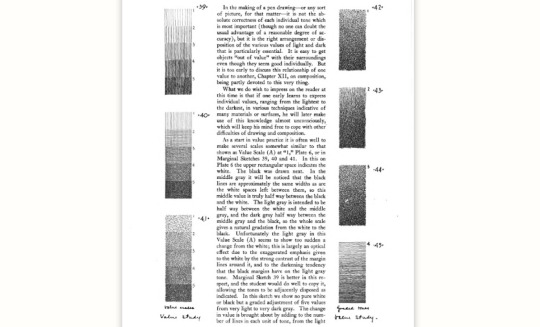
For the record, here are some value studies in gradient boxes from nearly a hundred years ago.
180 notes
·
View notes
Text
Levi vs. Zeke & Why Isayama Focused on that Conflict Analysis
Wanted to talk about "The Promise" (aka Levi's vow to take down Zeke) because a) I see it critiqued a lot as a narrative choice for Levi post-time skip, b) I don't think it's well understood as a narrative choice or even what it means in canon by the fandom, and c) I haven't seen people analyze it and thought why not me ¯\_(ツ)_/¯
So why did Isayama have Levi focus so much on the promise, and by extension Zeke, post-time skip?
1. Levi and Zeke are set up as narrative foils
This is established super early and is pretty evident even before we know much of anything about Zeke. In his introduction in the "Captain Levi" side chapter, Levi's character basics are quickly established, and one of the very first things we learn about him is how much he values the lives of his comrades and wants to make their sacrifices/deaths meaningful, regardless of any personal connection he has or doesn't have with them. We also see Levi very concerned about the Trost citizens starving in the Uprising arc, which leads Dimo Reeves to say in a pretty on-the-nose dialogue that Levi is "awkward yet kind" and trying to save Trost even though he "doesn't really have to".
By contrast, something hammered home to us very quickly is that Zeke is relatively indifferent to lives lost in his quest to achieve his goal, the euthanasia plan. That isn't to say that he's completely devoid of empathy so much as he views the lives lost as inconsequential or necessary and doesn't dwell on them because he doesn't even really understand the value of life- "I saved them, the lives of those children from this cruel world" is what he says to Levi about turning his squad into titans. There's also moments like when Colt begs Zeke to hold off on screaming so that Falco could be spared, Zeke acknowledges that pain, understands it, and then screams anyway.
We get a panel post-time skip to quickly establish that contrast right away:
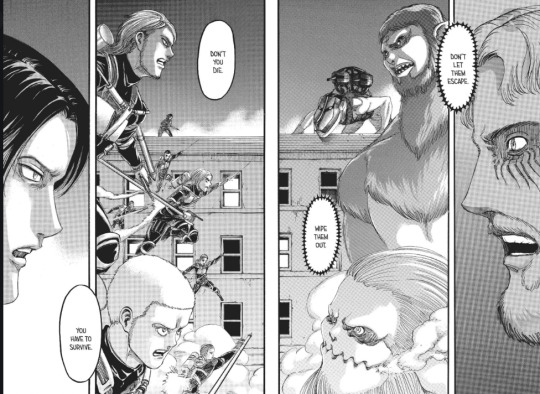
This indifference is actually what drives a lot of conflict between Levi and Zeke- Levi makes it clear he doesn't trust Zeke partially because as he says to him, even if he is unsure if Zeke wants to help Paradis, he can tell that Zeke doesn't really care about Ragnako village (and keeps bringing it up because he can tell "[Zeke] doesn't have a speck of guilt... those people's lives meant nothing to [Zeke]"), that he doesn't respond to the idea that his grandparents may die, etc. Levi also responds violently to the idea that Zeke "saved" his squad by killing them. The euthanasia plan is something that is so opposed to Levi's values that these two were always going to be in conflict- it's almost like Zeke's goal is the exact opposite of what Levi fights for.
This is kind of important for the overall themes and story for a couple reasons like:
Zeke's character arc is partially developing an appreciation for life's purpose beyond procreating and the small moments of connection and joy that make up the human experience, as evident by his conversation with Armin and actions in 137; the contrast and callouts by Levi help establish early on this inability to appreciate the inherent value of life before we even know Zeke's end goal
Indifference towards loss of life as long as it fits your personal goals is kinda contrary to what the story wants to tell you via the Rumbling and protecting lives that have no value to you is treated as a narratively good thing
There's also the fact that both of them have parental/fraternal relationships with Eren. They're both protective of Eren and give him advice; Eren also in turn has sought their knowledge as they are more experienced than him in certain areas (Levi as the Survey Corps vet, Zeke as the one most knowledgeable about titan/Ackerman history), so it's a mentorship relationship, too. Eren also takes their advice and knowledge in ways that I'm pretty sure neither intended (like I doubt Levi was thrilled that him encouraging Eren to make his own decisions turned out this way...)
There's also a contrast there- Levi calls Eren a "monster" who won't let anyone stop him from doing what he wants to do early into their relationship (correctly identifying who Eren is at his core) whereas Zeke sees Eren as a victim that Zeke needs to save for a really long time (which is how Zeke ends up so easily manipulated by Eren despite being so intelligent).
2. Levi / Zeke parallel Mikasa / Eren
While the relationships are very different, Levi/Zeke and Mikasa/Eren actually do parallel each other- there's a kind of Ackerman vs. Yaeger contrast set up. Despite the different relationships, they both end very similarly: Mikasa and Levi behead Eren and Zeke respectively in something of a partially wanted mercy kill that is necessary to better the world (stop the Rumbling, end the titan curse). There are even more parallels there, like how both Ackermans experience a moment of understanding of the respective Yeager before killing them, how both of them had recently had a moment where they were thinking- for different reasons- that they couldn't kill the Yeager brother and then ended up doing so, etc., but the point is the moments appear back-to-back (137 and 138) and are treated as pretty narratively similar.
There's a lot of reasons we could speculate as to why Isayama did this- I don't think it's an Ackermans are amazing, Yeagers suck message for the record- one of them could be as simple as illustrating the similarities of the Ackermans vs. Yeagers by generation
Or it could even be because Mikasa as a character reflects Levi in many ways and her character arc is partially illustrated by her evolving opinion of Levi. She begins as someone with no appreciation for authority and prioritizing her own people/interests (usually Eren) over the greater good/mission, which is illustrated by her respect, or lack thereof, of Levi. She lashes out at him, ignores his orders and then gets saved by Levi in the Female Titan arc, then in Uprising she doesn't want to at first and can't help but be snarky about it but she shows how she's able to see a bigger picture and respect Levi's leadership by defending it to Jean, Connie, and Sasha and allowing Levi to gamble Eren to make his deal with Reeves, and by the time of the Rumbling, when Levi tells her they can't be concerned about Eren's safety, she doesn't lash out and while upset, doesn't even argue.
It's not really a surprise that Mikasa is the one shown comforting/checking in on Levi right after he kills Zeke and Levi is the one spurring Mikasa on, saying "there the only ones left who can kill Eren" before she finds her resolve to do so (and also literally clears the way via thunderspear so Mikasa can kill Eren).
3. Levi's narrative purpose- or what even is the point of Levi post-explosion?
I've seen like ten thousand posts or comments saying something to the extent of "Levi should've died in the explosion, he has no point afterwards". I completely disagree, but beyond how dumb of a death that'd be for a character that's the most featured (most "screen time"/panel time) after EMA pre-time skip and EMA+Reiner post-time skip and story contributions that Levi brings (like leadership and direction for the Alliance with Hange dead after Armin is taken), Levi as a character embodies certain important themes/narrative messages for the story. Several of them are illustrated through his conflict with and contrast to Zeke.
His desire to protect people and preserve life even if they are strangers, or even in conflict with him, is highlighted through his juxtaposition to Zeke as discussed above
"Your deaths had meaning, at last I can prove it."
The big thing about the promise is that Levi wants to make the deaths, all of the sacrifices (Erwin but also all of the recruits that charged to their deaths), mean something. All of them sacrificed themselves to give Levi the chance to take down Zeke and Levi is tortured with guilt that he didn't finish the job because he views it as making their sacrifices meaningless. The promise serves to remind the reader that Levi cares so much about giving meaning to the fallen Survey Corps members' lives.
In his intro, Levi says to the Survey Corps rando that his death isn't worthless and it's not the end of his contributions to humanity because Levi will take up his resolve, that his death will inspire Levi, and Levi promises to end the titan threat with that resolve. One could argue that the promise is to remind us why Levi does what he does, what's driving him, the pressure of living with the need to make every sacrifice worth it- and in turn how Levi views/viewed ending the titan threat, a "world without titans", as the ultimate way to prove the sacrifices of the Survey Corps had meaning and his fallen comrades' lives weren't wasted. That's important because of Levi's ending, after the titans leave the world partially because of his efforts and him having seen through that mission until the end and getting a sendoff to the fallen Survey Corps members.
His focus on the next generation
A big theme of AoT is about protecting the next generation, and all of the OG Survey Corps believed this- we see many vets die to ensure recruits survive- but we see it articulated through Levi a lot. He seems to have a soft spot for children in general (getting concerned over the starving mother and baby in Trost, supporting Historia's orphanage plan, saving Ramzi after he pickpockets him, etc.), but he is also shown thinking about "getting the brats to the sea" as the purpose of the OG Survey Corps in 136, aka serving the dreams of the future/next generation- that's part of an internal monologue that begins with Levi focusing on Zeke and the promise.
The euthanasia plan is sharply at odds with Levi's "get the brats to the sea"/next gen protection mentality given it prevents a next generation of Elidians.
The contrast of Falbi and Zeke vs. Falbi and Levi. Zeke callously calls Falbi "miscalculations" in front of them- and Levi- not long after Levi meets Falbi for the first time, Levi spends the end of the Rumbling arc with Falbi after they arrive and they're the only two with him when Zeke calls out to Levi to end his life, Levi and Zeke actually discuss Falbi in the forest, etc. There's a weird sort of arc here since Falbi admired Zeke and felt betrayed by him (and he was indifferent to them when he screamed and knowingly turned Falco into a titan, killing Colt in the process, while Gabi desperately screams for Falco) while Falbi see Levi for the first time in the terrifying staged takedown of the Beast Titan and then end up spending more time in the end of the Rumbling arc fight with Levi than anyone else and Levi's last panel has him depicted as being with them, kind of like a reversal.
9 notes
·
View notes
Photo
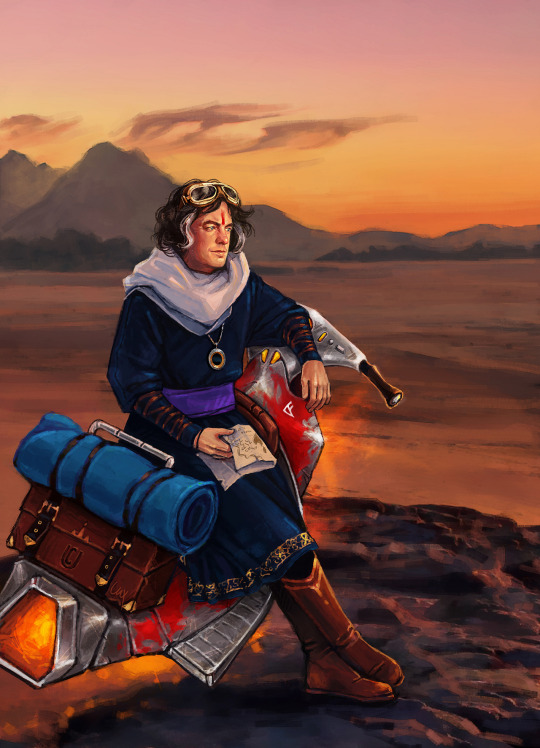
Drifter
Something I wanted to do for ages - an illustration to one of my original worlds. And I’m using James as a character because of reasons :D
Edit: the reasons :)
An intro for an AU fic set in one of my original worlds. Written a while ago and by now I honestly don't know when (if) I'm gonna finish it, and as a standalone bit it doesn't make much sense, but I guess it can provide some context for the art.
Guide You
Summary: Jeremy and Richard are set to have an adventure in the lands they know very little about, and of course, for that they will need a guide.
So it would appear they were going in the entirely wrong direction.
Hammond glares at Jeremy, weariness and anger on his little mug underlined poignantly by a ratty beard.
“You are a bellend, Clarkson,” he says very politely due to their new company, a nice change to all the abuse that was hurled at Jeremy for the last three days.
Their – well, Jeremy doesn’t want to say ‘saviour’, since they weren’t dying or anything – their finder inclines his head at Hammond’s expressiveness. An inclined hand is all the emotion that can be read off him, since he doesn’t remove his scarf or goggles, remaining mysteriously faceless and nameless.
“You could turn around and go in whichever direction you wished,” Jeremy retorts testily. He really doesn’t fancy appearing incompetent and pathetic in front of strangers.
“And then explain to your wife and children I just left you in the desert for the wild goats to feast on your flesh?”
Jeremy huffs, gesturing at his face. “Of course, the wild goats wouldn’t do you any harm since you look so much like one they’d accept you in their ranks immediately.”
Hammons scratches at his beard. “I look like Rob Dawny Jr and you know it. Don’t be jealous of my good looks.”
Jeremy lets out a massively sarcastic snort and the mystery man sighs and switches off the engine of his Falcon.
“Would you prefer to continue with this admittedly entertaining comedy double act or shall we make a camp?”
Jeremy and Hammond both grin at the comment and agree that the camp would be great.
“I’m Ainnay,” the man introduces himself at last, as they all dismount. “You, I gather, are from Ktider.”
“We are,” Jeremy nods, “I’m Clarkson, the midget is Hammond, and we were supposed to make a documentary about the desert but he’d challenged me to a race and then we got into the sandstorm and lost all our bearings.”
“You lost our bearings!” Hammond starts again, jabbing a finger at him. “I told you were going the wrong way!”
“Oh sure, because the direction you had proposed wouldn’t have lead us to the mountains a thousand miles from where we’ve started!”
“Yeah, where there’s at least some civilisation and not endless dunes with just an occasional goat skeleton stuck in a dried bush!”
“Gentlemen, please,” Ainnay interrupts them suddenly, holding his palms up. “It’s very easy to get lost in the desert, especially for someone who’s never been here before. Experienced Freemen sometimes get lost in sandstorms. I wouldn’t fight about it on your place. Of course, going for a race in the desert is another matter entirely,” he adds smoothly.
Jeremy gapes at him for a second, exchanges a glace with Hammond, and they both smirk.
“The race was definitely not my fault,” Jeremy says easily.
“You agreed to that!”
“And you agreed to follow me around! Five years ago, in fact!”
At last, Hammond gives up. “Yeah, all right, that was my biggest mistake and I have no choice but to concede it,” he says with as much sarcasm as he can muster.
While they were arguing, Ainnay managed to start a fire and somehow task semi-distracted Hammond with erecting a canopy, so Jeremy can celebrate his victory by sitting down and taking off his incredibly annoying itchy scarf.
“Ohh, I swear, it only cumulates the sand in your hair and does nothing to protect you from it!” he groans, scratching at his head vigorously, while Hammond nods along. “This is rubbish!”
Having brought all his pots and little bags under the canopy, Ainnay sits down as well. “It’s cos you’d put it on all wrong,” he comments. “I’ll show you later how it’s done, but one of the main things is that you put your goggles on it, not under it.”
Jeremy shrugs sheepishly and then has to spend a while ignoring Hammond’s speculations about the comfort of goggles-wearing, because Ainnay takes all his head-gear off as well and appears to be immensely pleasurable to look at.
Swallowing and averting his eyes with an effort from the sinfully pretty bow of pink lips, Jeremy hopes his blush will be mistaken for a heat rash. Will he ever be past this stupid and perverse notion of finding men attractive?
“Are you a Nahan, then?” he hears Hammond ask cautiously and looks up to see a red vertical stripe on Ainnay’s forehead, revealed now when he’s flicked the curls away from his face.
“I am. Couldn’t you tell that by me name?” he asks, looking confused, his accent very slight but audible now when Jeremy thinks about it.
Jeremy glances at Hammond, both of them shrugging.
“Not really. Should we?” Jeremy scowls. “Are we being massively ignorant and rude somehow, by any chance? In which case, please excuse us, we’ve literally came over here a week ago and know close to nothing about the local customs.”
Ainnay smiles, eyes squinted and sparkly, making Jeremy’s insides quiver. “No, not so far, although I can tell already you have a potential.”
Jeremy finds it in himself to snort and Hammond grins ruefully – well, he could get away with a lot, being stupidly charming when he wants to, but Jeremy has nothing to counterbalance his bellendism. He rather hopes he won’t offend Ainnay terribly at some point, as he does, indeed, has a lot of potential – and experience – in this area.
“Nahan people have pretty distinct names,” Ainnay explains calmly, making tea. “A Nahan man will always give you just one, it’s our ‘Amma namet’, a tribe’s name, given to us by someone from the tribe we live in. Those names are Ruisk in origin and usually descriptive – mine, for example, is two words: Ain – soft and Nay – hard.” Ainnay glances up from the tea, looking very soft and lovely indeed, and although Jeremy has known him for twenty minutes, he can tell the ‘hard’ part is there as well.
He nods. “Got it. Why is it always just one name?”
Ainnay offers them cups with tea and switches to making some sort of heavily spiced sandwiches that Hammond eyes with deep distrust.
“Do you believe in any sort of higher power – gods, fate, anything at all?”
Jeremy scowls at the sudden subject swerve. “No,” he says categorically, and Hammond shrugs with indifference. The little fussy moron sips the tea and tries very hard to not make a face – Jeremy thinks the tea is perfectly fine, but then again, Hammond is known to make faces at water. “I mean, we have organised religion in Ktider but it’s no more than a collection of fairy tales and a list of ridiculously strict rules and improbable threats of post-mortem punishment to make an illiterate peasant behave.”
Ainnay frowns fleetingly at that. “How odd. Well, here people do believe in higher powers, although no one’s imposing it on them. I would guess it’s because living somewhere as unpredictable and dangerous as a desert makes you invoke anything at all to ease your struggle with the world around.”
Jeremy contemplates it and nods. “Maybe. The seamen are like that as well – every sea-going man I’ve ever known was superstitious as hell, regarding the seas to be well, almost a deity of its own.”
Ainnay nods. “Yes, so is the desert – you know these lands as Tensah, I think, but it’s really the name of the goddess that is supposedly looking over us.”
Jeremy notes that Ainnay doesn’t seem to be very religious himself, wondering, why doesn’t he conform to the beliefs of his people.
“So what does it have to do with names?” Hammond asks, ever impatient and probably annoyed with the non-promising dinner.
Ainnay doesn’t look bothered with the rudeness, remaining serenely calm and immersed in the food making. “Our tribe names are designed to hide us from the goddess who’s known to not like men very much. Women go by the first name always, as they’ve nothing to fear.”
Men fearing a goddess sounds pretty entertaining – Jeremy’s heard about ancient people worshipping Earth like the ultimate Mother, and it was proposed by some historians in those ancient times women were the rulers – he wonders, whether it was or hell, still is, true for the local desert people.
“I think we have something similar to your Amma namet thing – nicknames,” Jeremy says on an afterthought. “His is Hamster,” he points at Hammond, making the latter glare.
Ainnay hums. “Yeah, we have nicknames too, but it’s not the same thing. Amma namet is absolutely formal and ritualistic rather than amusing and affectionate. It’s for permanent use, since our first name has to be hidden. The first name can only be used one on one, and only your mother can use it, or a person to whom you give that name – usually a life partner. So, if a Nahan man ever gave you his first name he would be actually saying ‘I love you and I want to spend my life with you’.”
“I hope to never hear that one,” Hammond says immediately, and Jeremy immediately and ridiculously wonders what is Ainnay’s first name.
Bad thought, he tells himself angrily. Incredibly bad and out of order.
They receive their plates with the sandwiches and Jeremy makes a point to declare it very tasty – which it is – to counterbalance Hammond’s politely concealed but still evident disgust.
“Don’t mind him. Hammond hates everything that isn’t eggs and gin,” Jeremy explains, talking away his portion to not waste anything.
Hammond lets him with relief. “I don’t hate everything. I’m just not used to foreign food, sorry. I have some crackers on me, I’ll be fine with those.”
Ainnay shrugs. “All right. What’s gin?”
They spend another hour discussing alcoholic beverages and food, Hammond increasingly horrified with Ainnay’s descriptions of the local drinks that seem to include snake bile and scorpions, until Jeremy realises that while remaining perfectly deadpan, Ainnay is having a lot of fun making Hammond queasy, and sits back to be entertained.
“There’s no such thing as rotten shark soup!” Hammond cries eventually, riled up and red in the face. “You’re having me on!”
Ainnay looks at him with clear-eyed sincerity. “Why would I be having you on? It’s a delicacy, I’ve had some, they serve it with fried whale intestines – it’s actually delicious, as long as you don’t breath in.”
On that, Jeremy gives up, giggling and pointing helplessly at Hammond’s constipated mug. “Your stupid tiny face, all scandalised,” he manages at last. “Ainnay, you’ve got to stop or Hammond will be sick.”
Looking pleased with himself, Ainnay nods. “As you wish. Although everything I said was the truth.”
“You’re worse than Clarkson,” Hammond says, looking hurt. “I hoped to meet someone nice on this journey.”
Ainnay’s expression remains as kindly and innocent as it was. “Tough luck.”
Jeremy dissolves in giggles again, delighted beyond words, and Hammond turns away pointedly, sulking.
“And here I thought we’ll be stuck with just the scenes of the dunes and Hammond moaning,” Jeremy says, pleased, patting his absorber under the coat. He’ll have to sort the stream soon, to not spend hours and days editing the raw material. “That would’ve made a boring show.”
Noticing Ainnay’s confusion, Jeremy produces the absorber disc from under the layers of his dusty robes. “We have them on us 24/7, basically. Bit difficult to make a comprehensive story out of the uninterrupted stream, but we resolved it by embracing a lot of the randomness. People like it, oddly enough.”
Ainnay just looks more confused. “Hold on. I did not understand a word. What is that thing?”
Hammond turns around from his sulking and his crackers to gape at Ainnay along with Jeremy. “You don’t know what it is?”
Ainnay shrugs. “Should I?”
Jeremy looks at his absorber. “Well, yeah, since it came from your part of the world. It’s black niurite, it absorbs the perception of a person connected to it.”
Still blank, Ainnay reaches for the absorber but thinks better of it. “Could you be more specific, please?”
“It absorbs your perception, things you see, or hear, or smell, or what you feel by touch – it stores it as a stream of uh, sensory experience. People then can duplicate it to their absorbers and tune in. It’s a bit like dreaming,” Jeremy tries to explain, “only it’s not your dreaming and everything is real. Well, you could tune into your own stream, which would be like remembering something, but you know, with full presence in the moment. So what Hammond and I are doing here is making a stream – after editing it’ll be his and mine streams in turn combined into one. There should be also a third-person perspective of our discmen, but since we’ve lost them right after coming here, it’ll be just our points of view, so to speak.”
Ainnay listens with his mouth open. “Whoa,” he manages at last. “That’s amazing!”
Bemused, Jeremy exchanges a glance with Hammond again. “Are you saying you have nothing like that in your lands?”
Still transfixed with the absorber, Ainnay shakes his head. “No. We don’t really know what to do with black niurite – your lot likes it enough to buy it, so we sell it to you. We just thought you use it for jewellery or something else decorative. Can you show me how it works?”
Luckily, Hammond has a spare absorber, so he gives it to Ainnay, tying his scarf around his eyes securely and explaining how to connect to it, which takes Ainnay a while but eventually, he lets out a startled yelp and waives his hands about, reacting to something Hammond has on it.
“Bloody Norah!”
Filing away the unfamiliar curse, Jeremy watches Ainnay go from flaily amazement to the stillness of intent concentration – he always loves to watch kids do it, but a grown man discovering streaming is especially endearing.
221 notes
·
View notes